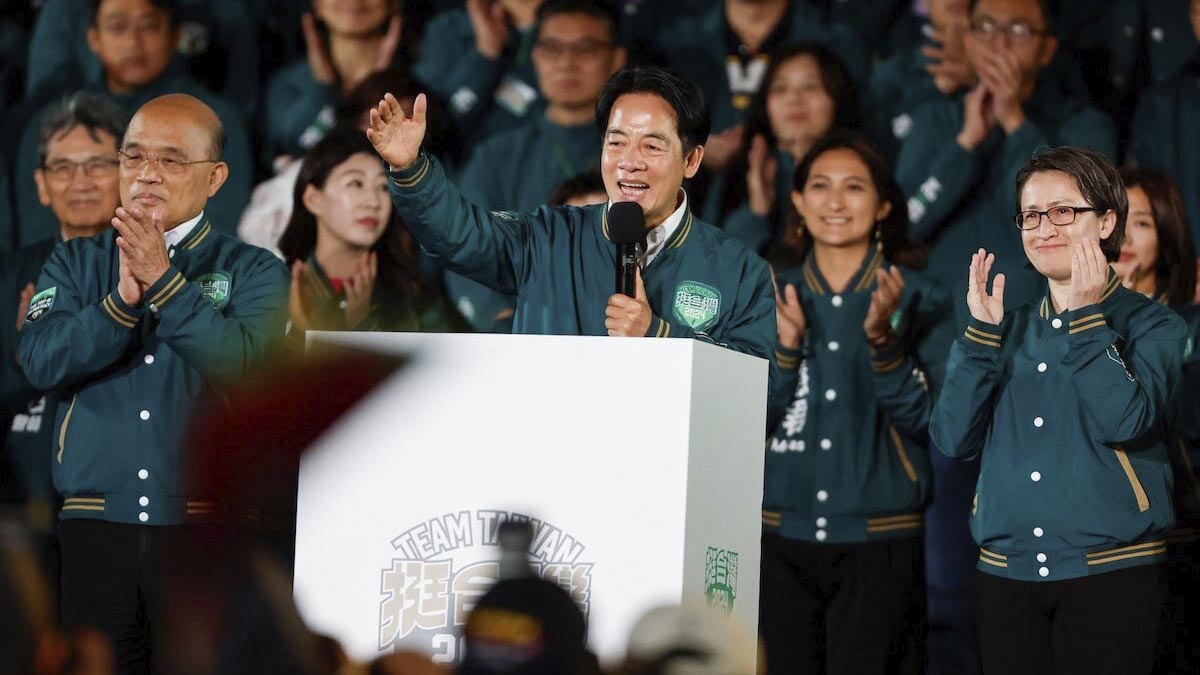
Taiwan Defies China, Electing New President Beijing Labeled Separatist “Troublemaker”
-
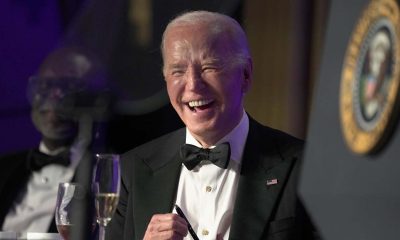

Biden Tries to Downplay Age with Jokes, Mocks Trump at White House Correspondents Dinner
-


Hamas’ Sexual Violence Against Israeli Women Is Revealed in New Documentary, ‘Screams Before Silence’
-


Thousands of Islamists Rally for Caliphate in Germany
-
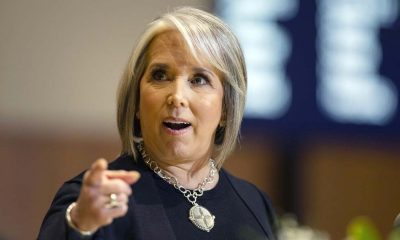

Leaked Audio: Dem Gov Rips Biden Admin Over Border Security
Voters in Taiwan elected Vice President Lai Ching-te as their next president on Saturday, defying warnings from Beijing not to support a candidate it has called a separatist and a “troublemaker.”
The presidential candidate for Taiwan’s main opposition party the Kuomintang, Hou Yu-ih, on Saturday conceded defeat in the election within hours of polls closing as Lai opened a wide lead of over a million votes. It is the first time in Taiwan’s history that the same political party has held three consecutive terms.
The election, which China had described as “a choice between war and peace,” could test recent efforts by Beijing and Washington to repair relations that in recent years have fallen to their lowest point in decades. The status of Taiwan is among the most sensitive issues between the two superpowers, and focus will now turn to any potential show of force from Beijing in response.
China claims Taiwan as its own territory and has not ruled out the use of force against the island, while the U.S. is Taiwan’s most important international backer. The majority of Taiwan’s 23 million people are in favor of maintaining the status quo, neither formally declaring independence nor becoming part of China.
Lai’s victory extends the eight-year rule of the Democratic Progressive Party (DPP), which is considered the least friendly to Beijing. Relations between Taiwan and China have deteriorated under President Tsai Ing-wen, who was first elected in 2016 and is limited to two terms.
Voters, especially younger ones, were concerned not just with China policy but with economic issues such as unemployment, housing costs.
While the final official tally is yet to come in, Lai secured a significant lead over Hou Yu-ih of the main opposition party, the Kuomintang, with Ko Wen-je, founder of the populist Taiwan People’s Party, trailing further behind. Hou and Ko, who both favor closer ties with Beijing, had argued that the DPP’s policies toward China were too confrontational.
“Because of democracy we can stand shoulder to shoulder with the international community,” Lai told NBC News in an interview last month. “We believe in democracy and that makes us different from China.”
As Taiwanese citizens headed to the polls Saturday, Beijing officials vowed to “smash” any attempt at full independence.
During a press conference following his victory on Saturday, Lai said he will continue foreign affairs and national defense in line with predecessor Tsai Ing-wen. China cut off direct dialogue with Taiwan after Tsai was elected in 2016.
Lai said he hopes that China will “understand that only peace will benefit both sides of the Strait. In addition, global peace and stability depends on peace in the Taiwan strait. We hope that China understands the situation, because China also has a responsibility.”
Lai will take office for four years starting May 20.
China has in the past fired missiles and staged military exercises in response to developments in Taiwan it doesn’t like, and the election on Saturday could bring another show of force. Taiwan’s government had already accused China of trying to interfere in the election through military and economic pressure as well as disinformation campaigns, while China accused it of “hyping up the threat from the mainland” to gain voter support.
The White House said this week that after the election, the U.S. would send an unofficial delegation to Taiwan, with which it has no formal relations, in what a senior Biden administration official said was an effort to manage tensions and prevent inadvertent conflict. The official, briefing reporters on the condition of anonymity, said any disruption to peace and stability in the Taiwan Strait, a key shipping route, “would seriously damage the global economy.”
The Chinese Foreign Ministry said Friday that the Taiwan election was China’s “internal affair” and that the U.S. should “refrain from intervening” in any form.
No matter the election results, “it will not alter the fundamental fact that Taiwan is a part of China,” spokesperson Mao Ning said at a regular news briefing in Beijing.
Lai, 64, has presented himself as “Tsai 2.0,” said Lev Nachman, a political scientist and assistant professor at National Chengchi University in Taipei.
“What that means is from a cross-strait relations perspective, we’re not likely to see a lot of change in the PRC-Taiwan dynamic, which is to say it’s going to remain very icy,” Nachman said, using the initials for China’s formal name, the People’s Republic of China.
Following Lai’s victory on Saturday, Nachman said on X that it was “less about Lai winning over hearts and minds of undecided voters” and more about the opposition KMT and TPP parties failure to “co-ordinate a joint ticket” producing a three-way race that “made Lai’s victory much, much easier.”
He added that if the two opposition parties ran on a combined ticket, “I do not think Lai would have won.”
China’s Taiwan Affairs Office has described Lai as a “stubborn Taiwan independence advocate” who if elected would promote separatist activities and “create a dangerous situation” in the Taiwan Strait.
China cut off direct dialogue with Taiwan after Tsai was elected in 2016 and has rebuffed offers of talks with Lai as well. It says it is willing to hold talks only if both sides agree that Taiwan is part of China, a policy reiterated by senior Chinese official Liu Jianchao during a visit to the U.S. this week and one that the DPP says it cannot accept.
In the run-up to the vote, Lai said he would “maintain the status quo,” asserting Taiwan’s de facto independence and actively engaging with the U.S. and other democracies. But he said Taiwan’s door “will always be open to engagements with Beijing under the principles of equality and dignity.”
With Lai’s election, “we’re likely to see the same level of threats we see from the PRC, but threats don’t equal conflict,” Nachman said, noting that neither China nor Taiwan wants to go to war.
The U.S. and China, the world’s two largest economies, have increased their interaction since a November meeting in California between President Joe Biden and Chinese President Xi Jinping, their first encounter in a year.
This week, in what appears to be partly an effort to protect the fragile gains in their relationship from tensions over the Taiwan election, the U.S. and China resumed long-frozen military talks in Washington, while Commerce Secretary Gina Raimondo had a call with her Chinese counterpart, Wang Wentao.
Secretary of State Antony Blinken also met with Liu, the senior Chinese official, on Friday. The State Department said Blinken reiterated the importance of maintaining peace and stability in the Taiwan Strait, and that both sides “recognized the importance of continuing to maintain open channels of communication.”

News
Trump Biggest Lead Ever Over Biden in CNN Poll
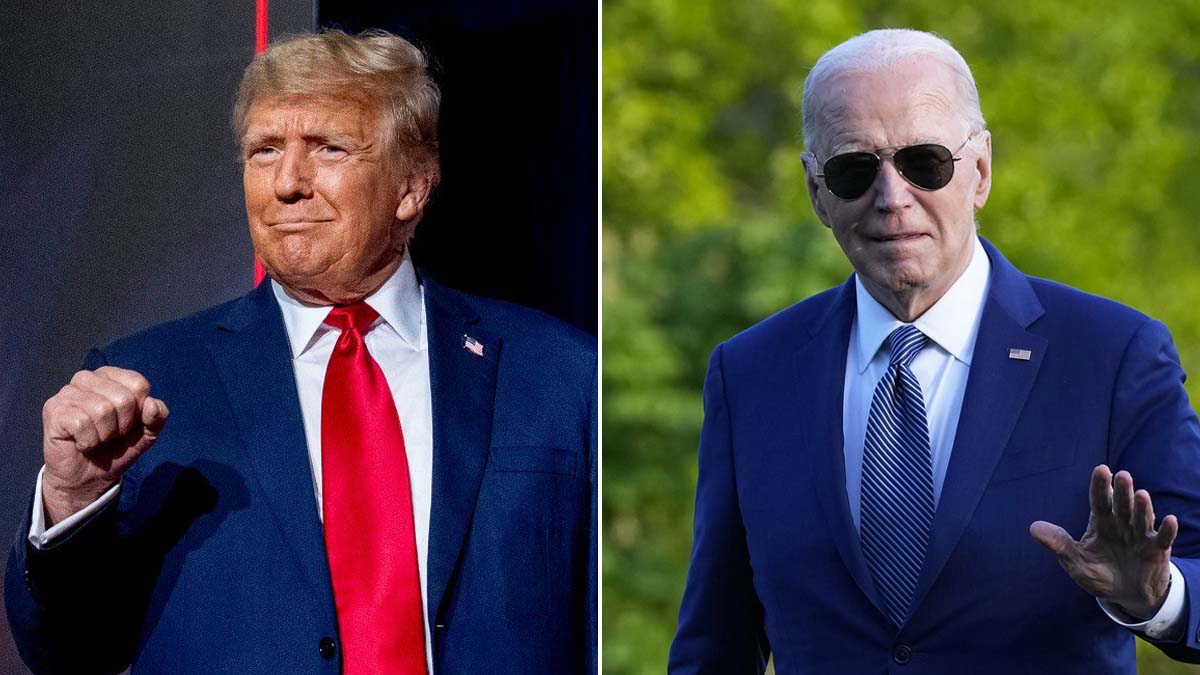
Former President Donald Trump has opened his biggest lead ever captured in the CNN poll of the American electorate, enjoying a six-point advantage over incumbent Democrat President Joe Biden.
Trump, at 49 percent, is six percent ahead of Biden’s 43 percent when the two are polled head-to-head.
When third-party candidates like Robert F. Kennedy Jr., Dr. Jill Stein, and Cornel West are added into the field, Trump’s lead over Biden grows to nearly double digits. In that multi-candidate scenario, Trump is at 42 percent, Biden is down at 33 percent, Kennedy is at 16 percent, West at four percent, and Stein at three percent.
That’s a nine percent lead for Trump nationally, an astounding number that if true would signal the former president is on track for an electoral college romp of Biden.
The CNN/SSRS poll was conducted from April 18 to April 23, and surveyed 1,212 American adults, including 967 registered voters, and has a margin of error of 3.4 percent for the full sample and 3.8 percent among registered voters. The numbers for the presidential race are from the registered voters sample.
CNN, in its story about the poll, found most Americans look back on Trump’s presidency positively—and look at Biden’s presidency negatively. CNN’s Jennifer Agiesta wrote that “in the coming rematch, opinions about the first term of each man vying for a second four years in the White House now appear to work in Trump’s favor, with most Americans saying that, looking back, Trump’s term as president was a success, while a broad majority says Biden’s has so far been a failure.”
“Looking back, 55% of all Americans now say they see Trump’s presidency as a success, while 44% see it as a failure. In a January 2021 poll taken just before Trump left office and days after the January 6 attack on the US Capitol, 55% considered his time as president a failure,” Agiesta wrote.
“Assessing Biden’s time in office so far, 61% say his presidency thus far has been a failure, while 39% say it’s been a success. That’s narrowly worse than the 57% who called the first year of his administration a failure in January 2022, with 41% calling it a success.”
Biden’s approval ratings on key issues like the economy and inflation, 34 percent and 29 percent respectively, is abysmal and seems to be working against him harshly. “In the new poll, 65% of registered voters call the economy extremely important to their vote for president, compared with 40% who felt that way in early 2020 and 46% who said the same at roughly this point in 2016,” Agiesta wrote.
“Those voters who say the economy is deeply important break heavily for Trump in a matchup against Biden, 62% to 30%.”
The poll’s release comes two weeks into Trump’s trial in New York City at the hands of Democrat District Attorney Alvin Bragg, and right after Biden roasted Trump at the White House Correspondents’ Dinner on Saturday evening.
While Trump is mostly stuck in a New York City courtroom, the campaign continues and Trump has sought to take advantage of having to be in New York by meeting with union workers and doing things like visiting a bodega whose owner was famously attacked.
Biden, meanwhile, has expended most of his efforts on trying to shift the national conversation off the economy, immigration, and national security to abortion, visiting Florida in recent weeks to highlight a forthcoming Sunshine State ballot initiative on the matter.
News
Biden Tries to Downplay Age with Jokes, Mocks Trump at White House Correspondents Dinner
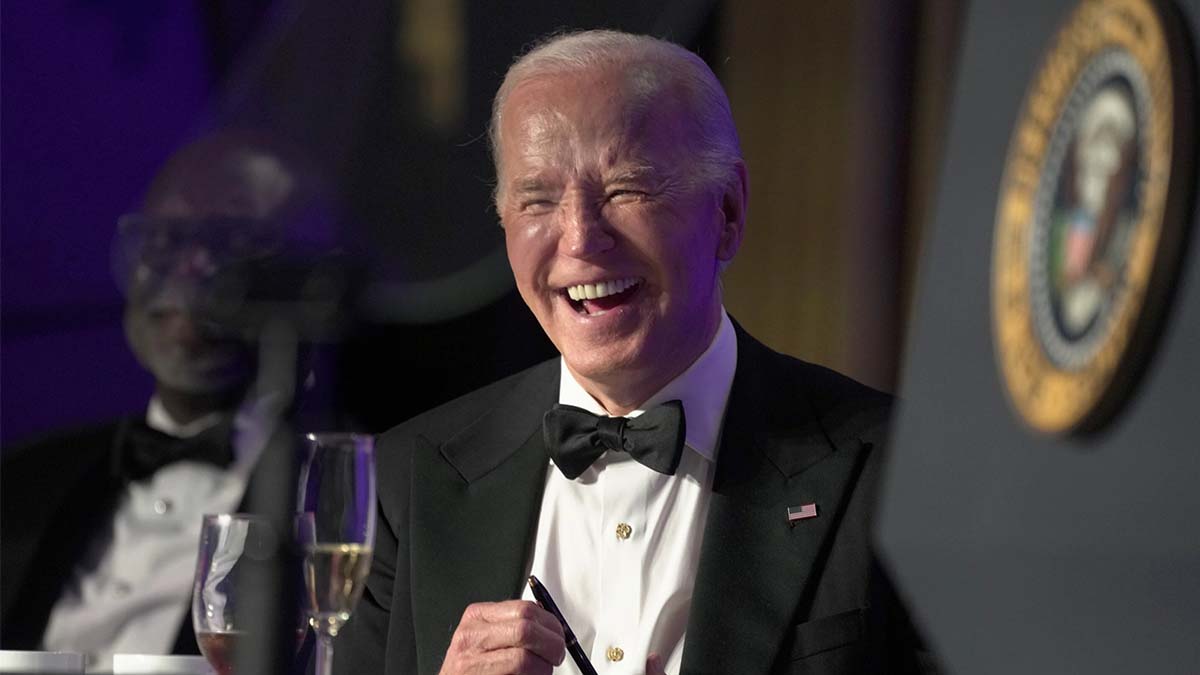
President Biden took the stage at the annual White House Correspondents Dinner on Saturday and cracked jokes about his old age.
Biden spoke before a crowd of nearly 3,000 journalists, celebrities and Washington insiders at the Washington Hilton in Washington, D.C., as hundreds of anti-Israel protesters rallied outside.
The black-tie annual event gives Biden a major platform to speak to voters — and flex his sense of humor — while his approval rating sits at a historic low ahead of the November election.
Biden, 81, made jokes to make light of voters’ concerns about electing him into office for another four years in his advanced age.
“The 2024 election is in full swing. And yes. Age is an issue. I’m a grown man running against a 6-year-old,” the president quipped about his opponent, former President Donald Trump.
“I feel great, I really feel great,” he assured the crowd. “I’m campaigning all over the country. Pennsylvania, Georgia, North Carolina — I’ve always done well in the original 13 colonies.”
He also took some jabs at himself, saying that at last year’s dinner his wife told him she was nervous about his speech.
“I said to her ‘Don’t worry, it’s just like riding a bike. She said ‘that’s what I’m worried about’,” he joked about his infamous bike fall in Delaware in 2022.
Biden also took the offensive against Trump, poking fun at his strange, rambling speech in Gettysburg, Pennsylvania, in which he reminisced about the Civil War battle there.
“Trump’s speech was so embarrassing that the statue of Robert E Lee surrendered again,” Biden said.
“Age is the only thing we only have in common,” he said about himself and Trump, who is 77.
“My vice president actually endorses me,” he teased the former president for not receiving the endorsement of his vice president Mike Pence.
BREAKING: Biden attacks Trump at the White House Correspondents Dinner, says, “I’m a grown man running against a six-year-old.” says, “My vice president actually endorses me,” talks about “Stormy Weather.” WATCH pic.twitter.com/nfJ5ipjQsa
— Simon Ateba (@simonateba) April 28, 2024
Biden also lampooned the former president and his ongoing Stormy Daniels hush money trial in Manhattan: “Donald has had tough few days lately — you might call it stormy weather.”
“I’ve had a great stretch since the State of the Union. Donald has had a tough few days lately — you might call it stormy weather,” he said.
Biden also couldn’t resist going after Trump’s ego.
“Trump so desperately started reading those bibles he’s selling, then he got to the first commandment, ‘You should have no other God before me.’ That’s when he put it down and said this book’s not for me,” the president said.
Following Biden’s 10-minute speech, Saturday Night Live Weekend Update co-host Colin Jost roasted the president, politicians and media.
Jost did not hold back on making fun of Biden’s age.
After a photo of Jost from his high school days was shown on the screen, the comic said it’s not fair that Biden couldn’t be embarrassed with a high school photo “because the technology wasn’t invented yet.”
“I was excited to be up here on stage with President Biden tonight, mostly to see if I could figure out where Obama was pulling the strings from,” he joked.
“I got to be honest, It’s not easy following Biden. I mean it’s not easy following what he’s saying,” Jost added.
Trump also caught lots of flak from the SNL veteran.
“I also just wanted to point out, it’s 10 p.m. and Sleepy Joe is still awake, while Donald Trump has spent the last week falling asleep in court every morning,” Jost said.
Jost also cracked about his favorite hometown newspaper, The New York Post.
“Apologies to the New York Times, but as a Staten Islander, I get all my news from the New York Post. The only paper where the front page always has the same 200-point font, whether the headline is ‘World War Three to Start Tomorrow’ or ‘Central Park Owl Dead in Building Collision,’” the comic joked.
Ahead of Saturday’s event, Jeffrey Katzenberg, co-chair of Biden’s reelection campaign, reportedly held daily strategy sessions this week with his campaign team fine-tuning Biden’s comedy set, which was drafted by speechwriter Vinay Reddy, CNN reported.
Over several hours, including a four-hour session Friday night, Biden aides worked with the president to tweak his delivery and tone, according to the outlet.
One of the most pressing issues for the incumbent president going into the election is Israel’s war in Gaza, which has lost him vital support among left-leaning Democrats, imperiling his reelection prospects.
Hundreds of pro-Palestinian protesters gathered outside the Washington D.C. Hilton in force ahead of Saturday’s dinner, harassing the well-dressed guests as they walked into the event.
A massive Palestinian flag was draped over the side of the hotel, video shows. Other protesters stormed the red carpet as celebrities snapped photos behind them.
Palestinian supporters have repeatedly dubbed Biden “Genocide Joe” for his ongoing support for Israel’s war, which has left some 34,000 Gazans dead. He’s most recently come under fire this week for signing a $95 billion foreign aid package, which includes $26 billion for Israel.
The White House Correspondents Dinner raises money annually for scholarships for students looking to pursue a career in journalism.
At last year’s dinner, Biden promised to free Wall Street Journal reporter Evan Gershkovich, who was arrested in Moscow on espionage charges last March.
This week, a full year later, a Moscow court rejected the journalist’s appeal to be released from pretrial detention, meaning the 32-year-old will remain behind bars until at least June 30.
Biden reiterated his vow to bring Gershkovich home, as his parents sat in the audience.
“We’re doing everything we can to bring home fellow journalists,” he said.
News
Kristi Noem’s VP Odds Crash After Dog Slaughtering Confession

After South Dakota Gov. Kristi Noem admitted killing her dog and a family goat in her new book, her chances of becoming Donald Trump’s vice president have completely crashed, according to an online betting market.
On Polymarket, where gamblers can bet on just about anything under the sun, Noem’s self-admitted shooting of her 14-month-old wirehair pointer puppy has tanked her odds of being Trump’s running mate to just 4 percent, way down from the 10 percent chance she had just this Thursday, Newsweek reported.
Bettors think South Carolina Senator Tim Scott has the best shot – a 22 percent chance – at becoming Trump’s new right hand man, while New York congresswoman Elise Stefanik and Ohio Senator J.D. Vance – long considered potential favorites for the VP slot – are sitting at 9 percent and 6 percent, respectively.
This comes as President Joe Biden has recently overtaken the GOP’s assumed candidate Trump in the betting odds of who’ll win the election, with people favoring the Democrat by a little over a percentage point.
Noem explains in her forthcoming book that she gunned down her own animals to show she’s capable of dealing with anything that’s ‘difficult, messy and ugly.’
The book, titled No Going Back: The Truth on What’s Wrong with Politics and How We Move America Forward, will be released on May 7.
In her book, Noem writes about the dog, named Cricket, that she shot at the gravel pit on her family property, moments before her children came home from school.
The dog, Noem claimed, had an ‘aggressive personality’ that couldn’t be tamed – as evidenced by the fact that Cricket ruined a pheasant hunt for being ‘out of her mind with excitement, chasing all those birds and having the time of her life.’
Additionally when the South Dakota governor took Cricket with her to meet a local family the dog started killing the family’s chickens like ‘a trained assassin.’
According to a book excerpt obtained by the Guardian, Cricket ‘grabbed one chicken at a time, crunching it to death with one bite, then dropping it to attack another.’
When Noem finally grabbed the dog she wrote that Cricket ‘whipped around to bite me.’
Cricket was ‘the picture of pure joy.’ Meanwhile the chickens’ owner wept.
Noem said she wrote a check ‘for the price they asked, and helped them dispose of the carcasses littering the scene of the crime.’
‘I hated that dog,’ Noem wrote, believing the 14-month-old pooch to be ‘untrainable,’ ‘dangerous to anyone she came in conatct with’ and ‘less than worthless … as a hunting dog.’
So she decided to kill Cricket.
‘At that moment,’ the governor wrote. ‘I realized I had to put her down.’
She shot Cricket at the family’s gravel pit.
‘It was not a pleasant job,’ Noem said, ‘but it had to be done. And after it was over, I realized another unpleasant job needed to be done.’
Noem decided to off the family goat as well because he was ‘nasty and mean,’ as he remained uncastrated and smelled ‘disgusting, musky [and] rancid’ and ‘loved to chase’ the governor’s children.
She ‘dragged him to the gravel pit’ as well, but the goat jumped as she tried to shoot him, leaving him briefly alive.
Noem said she had to go back to her truck and retrieve another shell and then ‘hurried back to the gravel pit and put him down.’
Her actions were witnessed, she said, by a construction crew working nearby.
Moments later, the bus dropped off her kids.
‘Kennedy looked around confused,’ Noem recalled of her daughter, who asked, ‘Hey where’s Cricket?’
Noem then admitted, ‘I guess if I were a better politician I wouldn’t tell the story here.’
News
Green Party Presidential Candidate Jill Stein Arrested During Pro-Palestinian Protest
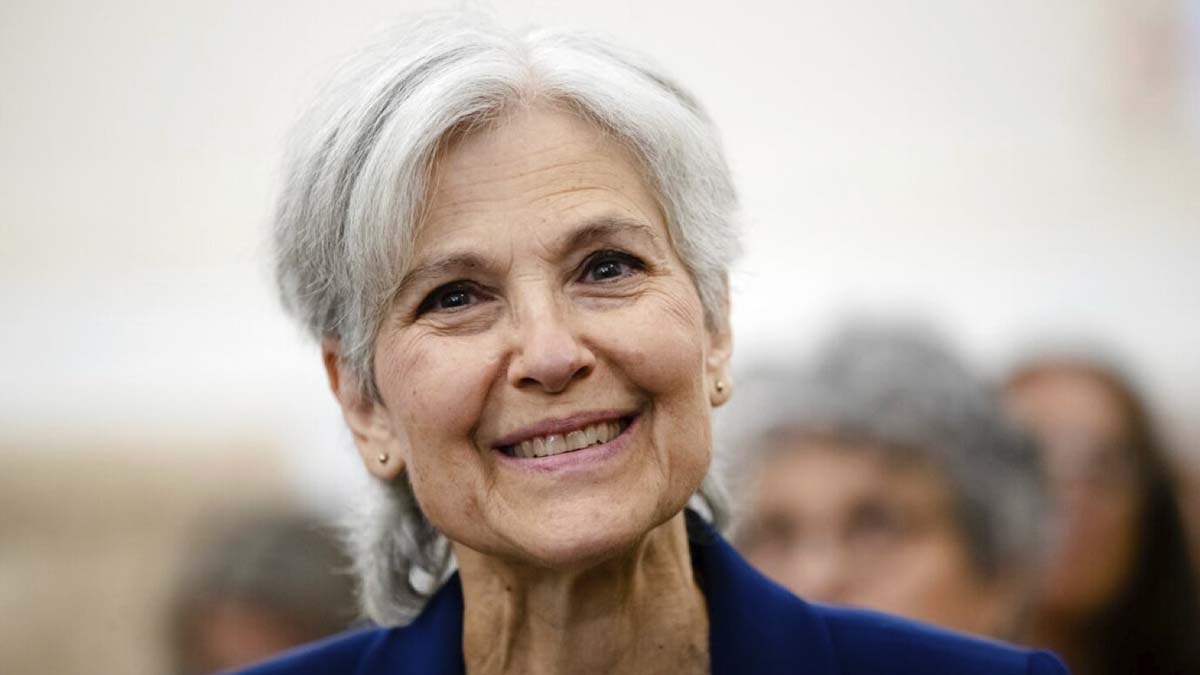
Green Party 2024 presidential candidate Jill Stein was arrested at Washington University in St. Louis during a pro-Palestinian protest Saturday.
Stein, her campaign manager Jason Call, and deputy campaign manager Kelly Merrill-Cayer were among the at least 80 protesters arrested at the campus encampment. Washington University’s protest is one of dozens unfolding across college campuses in the United States in recent days.
“The demand from the encampment was specifically for the university to divest from Boeing, which manufactures munitions used in the ongoing genocide against the Palestinian people in Gaza at their nearby St Charles facility,” Call said in a statement to the Washington Examiner.
“The Stein campaign supports the demands of the students and their peaceful protest and assembly on campus. Student protest for peace and civil liberties has always represented the best part of our collective moral conscience. Solidarity,” The statement said.
Washington University confirmed that more than 80 protesters were arrested, saying in a statement that “It quickly became clear through the words and actions of this group that they did not have good intentions on our campus and that this demonstration had the potential to get out of control and become dangerous. When the group began to set up a camp in violation of university policy, we made the decision to tell everyone present that they needed to leave.”
The statement continued, “All will face charges of trespassing and some may also be charged with resisting arrest and assault, including for injuries to police officers.”
According to her campaign, Stein was charged with assault, while Call and Merrill-Cayer were charged with criminal trespass.
BREAKING: Jill Stein and her Campaign Manager and Deputy Campaign Manager, Jason Call and Kelly Merrill-Cayer, have been arrested at Washington University in St. Louis while supporting a protest against WashU’s ties to the war on Gaza.
Video from @KallieECox pic.twitter.com/rkUYC9b5Qx— Dr. Jill Stein🌻 (@DrJillStein) April 28, 2024
According to one video, police used a bicycle to push against Stein and the other protesters. Stein called the use of force “shameful.”
This video shows police use of force against Jill and others at Washington University: https://t.co/wsFA5uocJi
— Dr. Jill Stein🌻 (@DrJillStein) April 28, 2024
Across the U.S., thousands of college students have set up encampments on their campuses, calling for a divestment from Israel, which has increased tensions on campus as some have turned anti-semitic.
The University of Southern California has canceled its main graduation ceremony due to campus unrest. At Columbia University, classes were moved to a hybrid format for the remainder of the semester.
News
Stunning New Forecast for U.S. National Debt
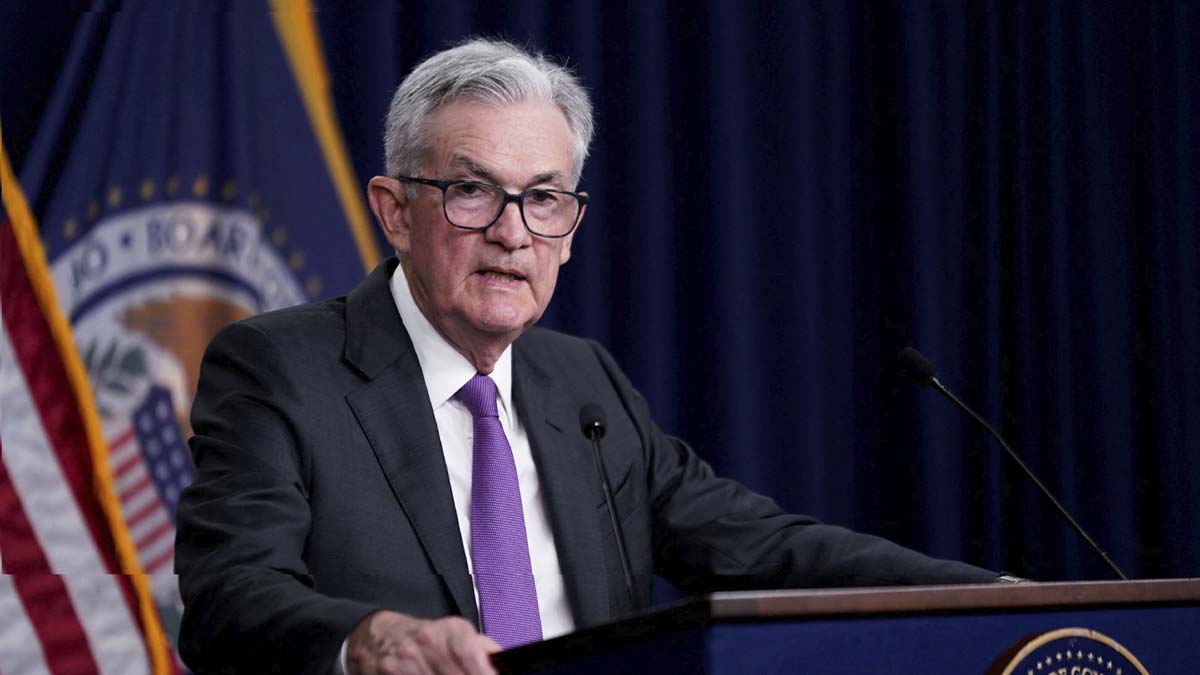
National debt is fast becoming the thorn in the side of the American economy that nobody wants to extract—and it will continue to cause damage, sending the U.S. into financial crisis and 10 years of stagnation.
That is increasingly the opinion of a growing number of experts who are sounding the alarm over the pace at which the U.S. government is gathering debt. More important, they fear this debt will mean the country will not be able to afford necessary borrowing in the future, in addition to the funds needed to service existing debt.
Among the ranks of those in the concerned camp are Fed Chairman Jerome Powell, JPMorgan Chase CEO Jamie Dimon, Bank of America CEO Brian Moynihan, BlackRock CEO Larry Fink, and Wharton vice dean Joao Gomes.
Their outlook is evidenced by a March report from the Congressional Budget Office (CBO). The CBO estimates that by 2054 public debt will represent 166% of GDP, reaching $141.1 trillion.
Currently the nation’s $34 trillion debt is approximately 99% of GDP and, according to the CBO, will steadily increase over the next 30 years. In the near term, the CBO expects debt as a percentage of GDP to exceed the record peak of the Second World War by 2029.
This mounting debt, the CBO writes, “would slow economic growth, push up interest payments to foreign holders of U.S. debt, and pose significant risks to the fiscal and economic outlook; it could also cause lawmakers to feel more constrained in their policy choices.”
The report goes on to add that the likelihood of a financial crisis is increasing as a result of growing debt, something which would cause interest rates to spike and, if paired with higher inflation, “could erode confidence in the U.S. dollar as the dominant international reserve currency.”
The outlook from the U.S. Government Accountability office (GAO) isn’t much better. A report released last month said the government is facing an “unsustainable” fiscal path that poses a “serious” threat to economic, security, and social issues if unaddressed.
The GAO advises Congress to make “difficult budgetary and policy decisions to address the key drivers of federal debt and change the government’s fiscal path,” adding: “The sooner actions are taken to change the long-term fiscal path, the less drastic they will need to be.”
As evidence of a fantastically complex fallout piles up, one might assume it will take an equally complicated approach to prevent it. Economists say that’s not the case—but that’s only if they believe it’s an issue at all. The hardest problem is precisely that: getting enough people to listen.
A sudden reckoning
Wharton’s Gomes has been making his concerns about the level of national debt known for some time now, and last week—following an interview with Fortune—he sat before the U.S. Senate Committee on the Budget and warned them of a train wreck ahead.
The vice dean of research at the University of Pennsylvania’s Wharton School previously argued too few high-profile individuals were taking the matter seriously, but as an up-and-coming economist he felt compelled to step away from the pack to sound the alarm.
“The coming fiscal crisis will be triggered by a sudden loss of confidence by the general public in the federal government’s finances and on those tasked with managing them,” Gomes told chairman Sheldon Whitehouse and ranking member Chuck Grassley. “The projected path for the U.S. federal debt makes this … inevitable in the not too distant future.”
Among the fallouts from the crisis professor Gomes foresees is a sharp decline in the value of the dollar as interest rates spiral higher. He also believes inflation will spike as the government is forced to roll back on social programs to wrestle the deficit under control.
“These measures would have a further devastating effect in the economy, leading to a decade-long stagnation,” Gomes explained. “Given our projected demographic challenges, many older, and marginally attached, workers are likely to leave the labor force never to return again.”
‘Changing this future is not that difficult’
Professor Gomes outlines two well-known options to rebalance the variables: increase growth or cut spending. The former is by far the most preferable, Gomes said, but it wouldn’t accelerate quickly enough to do the job.
Even then, “the required fiscal correction is not drastic,” he added. “We certainly do not need to repay any part of the outstanding debt to prevent a crisis. In fact, government debt can continue to grow steadily over time without posing an immediate threat to the nation’s fiscal solvency—as long as the yearly deficits are not excessive.”
A fiscal adjustment of around 1.4% of GDP—or $400 billion—spread over two or three years would nip the issue in the bud, Gomes estimates.
However without a course correction a fiscal crisis is likely to occur in 2030, said Gomes, or as early as 2025 if the next administration rolls out an “expensive fiscal package that relies on implausibly rosy economic assumptions.”
Regardless, warns Gomes: “Its consequences will be severe and leave lasting—probably irreversible—scars on our economy and society.”
Redoing the math
Economists are increasingly revising the bill future generations will have to foot in order to pay for the fiscal outlays of governments way back when. However, that comes with a major caveat: a global pandemic.
For example, in 2019 the CBO projected U.S. public debt by 2049 would be 144% of GDP; by March’s estimate that figure stands at more than 150%.
However the ratio—and corresponding forecasted debt figure—does fluctuate depending on whom you ask. Even the CBO as recently as September 2023 projected the figure to be higher—estimating an 153% debt-to-GDP ratio by 2053.
The GAO puts debt at 200% of GDP by 2050, while the Penn Wharton Budget Model projects 190% of the size of the economy by the same year.
News
Hamas’ Sexual Violence Against Israeli Women Is Revealed in New Documentary, ‘Screams Before Silence’

Almost seven months after Hamas’ slaughter of 1,200 Israelis on October 7, a new documentary is set to be released that reveals the horrific atrocities and sexual assaults that took place that day.
Fox News Digital reported that former Facebook COO Sheryl Sandberg’s documentary, “Screams Before Silence,” includes firsthand accounts of the horrible events that transpired on October 7, where over 1,000 Israelis were killed and 240 more taken as hostages back to Gaza.
“When you hear this chaos for like 20 minutes or 15 minutes, you understand that something much worse [is] happening right over there. It doesn’t stop. That was the the time when I started to be afraid I’m going to be raped,” a woman recalled from the Nova Music Festival attack.
Sandberg said that she decided to take on the project because “the world needs to see and acknowledge what happened.”
“After October 7th, the reports were coming out about not just mass murder, but mass sexual violence. And the usual people who should be speaking out were either ignoring it or denying it. And that’s not okay,” she continued.
The documentary takes viewers back to October 7, allowing them to hear from first responders and survivors who were on the ground.
Sandberg mentioned that the documentary will prove to viewers that Hamas members had deliberately set out to commit sexual violence against Israeli women.
In late 2023, Israeli actress Gal Gadot took to Instagram, sharing her thoughts on the matter, saying: “We claim we stand against rape, violence against women. We will not let women be victimized and then silenced. We say we believe women. Stand with women. Speak out for women.”
View this post on Instagram
“On October 7th, the world witnessed Hamas carrying out its violent plans in real time. Within hours of the October 7th attack, the first blood-chilling video emerged of Shani Louk being paraded naked and defiled by her proud assailants,” Gadot wrote on the social media platform, referring to Shani Louk, the German-Israeli tattoo artist who was kidnapped by Hamas.
Gadot continued: “Yet two months later women are still hostage to these rapists and the world has failed to call this situation what it is: an urgent emergency that demands a decisive response.”
“This is our moment as women and allies of women to act. I am beseeching all those who have done so much for women’s rights globally – from the UN, to the human rights community, to please join in the demand that Hamas release every single woman hostage immediately – not after the next round of international mediation, not after another day. These women cannot survive another moment of this horror.”
The documentary, in tandem with a thorough investigation carried out by the New York Times, seems to suggest that Hamas committed sexual assault many times on October 7. However, there are pro-Palestinian activists — many of which live in the U.S. — have denied that these sexual assaults actually took place.
News
Thousands of Islamists Rally for Caliphate in Germany
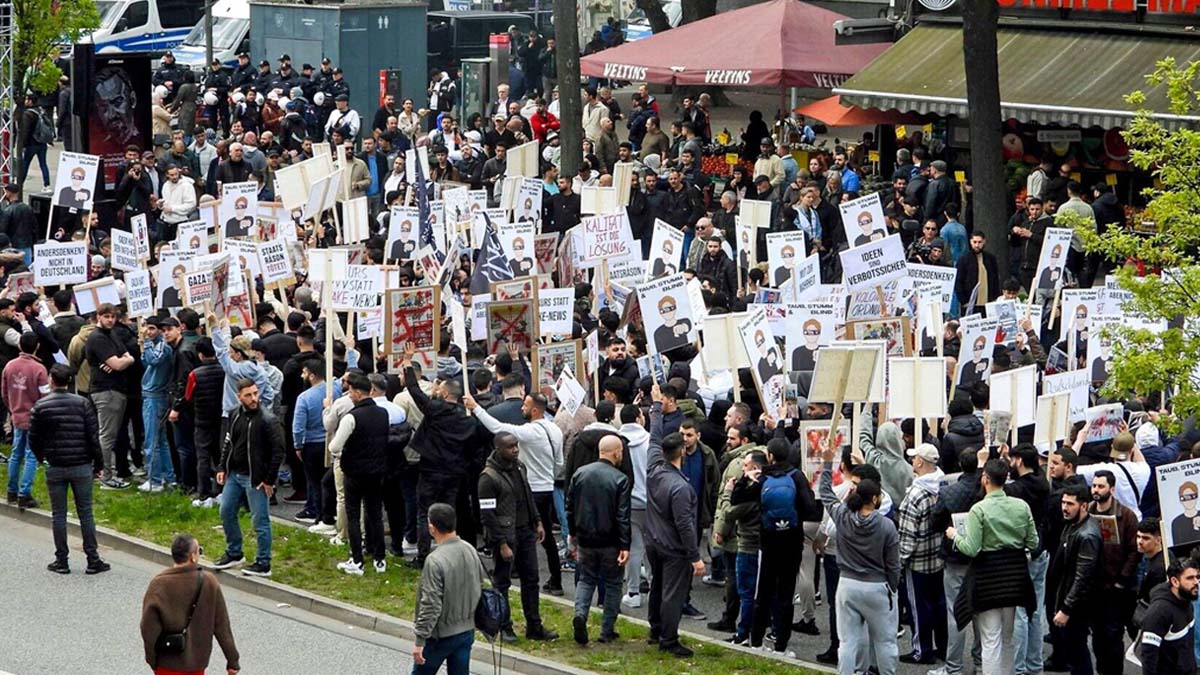
Some 1,000 protestors gathered in Hamburg’s Steindamm Street on Saturday, calling for an end to “dictatorship values,” according to the German daily Die Welt.
In a video posted on X, the crowd can be seen responding to shouts of ‘Takbir’ with “Allahu Akbar.” The video also shows the mob shouting part of the Shahada in Arabic, “There’s no God but God.” One demonstrator held a placard that read “Caliphate is the solution,” while others held signs with the inscription “Gaza has won the info war.”
Germany: “Kaliphate is the solution” poster at demonstration of the Islamist group “Muslim Interactive” in Hamburg.
— Azat Alsalem (@AzzatAlsaalem) April 28, 2024
The German daily newspaper noted the rally was organized by a group named “Muslim Interaktiv,” which also posted the video from the rally on its X account under the banner “Do not obey liars! Impressions from today’s demonstration in Hamburg.”
Behind Muslim Interaktiv
Die Welt further stated that according to the Hamburg Office for the Protection of the Constitution, the group is an extremist Islamist organization affiliated with the Hizb ut-Tahrir, a pan-Islamist, fundamentalist political organization that has for the purpose of the re-establishment of a caliphate. This political organization is banned from operating in Germany, as per the Hamburg office.
According to Ynet and German media, a leader of “Muslim Interaktiv” is the 25-year-old Joe Adade Boateng, also known as Raheem Boateng, who is studying education at the University of Hamburg.
He has a large presence on Instagram and TikTok, where he shares Islam-related content, targeting young Muslims in Germany.
Both he and “Muslim Interlaktiv” have addressed the Israel-Hamas war on social media. One joint post from December 2023 read, “Our main account has been blocked due to censorship surrounding the current genocide in Gaza. The government is trying to stop our activities using all possible means.”
News
Bishop Who Was Stabbed During Service Returns to Mass with Fiery Sermon

The Bishop who was stabbed in an alleged terror attack on the Christ the Good Shepherd Church in western Sydney has delivered a fiery sermon on his return to the pulpit, calling out Prime Minister Anthony Albanese in an impassioned defense of freedom of speech and religion.
Bishop Mar Mari Emmanuel, carrying a gold cross and sporting a white eye patch after he suffered lacerations to his face in the alleged April 15 attack, said he could not “fathom” how freedom of speech could not be possible in a democratic country.
“I say to our beloved, the Australian government, and our beloved Prime Minister, the honorable Mr Albanese, I believe in one thing and that is the integrity and the identity of the human being,” he said.
“This human identity, this human integrity, is a God-given gift, no one else.
“Every human being has the right to their freedom of speech and freedom of religion.”
He said Buddhists, Hindus, Muslims and Atheists had the right to express their beliefs.
“Also the Christians have the right to express their beliefs, and for us to say, that free speech is dangerous, that free speech cannot be possible in a democratic country, I’m yet to fathom this. I’m yet to fathom this. We should be able as civilised human beings, as intellectuals, we should be able to criticise, to speak, and maybe, at some certain times, we may sound, or we may come across offensive to some degree, but we should be able to say, ‘I should not worry for my life to be exposed to threat or to be taken away’.
“A non Christian can criticize my faith, can attack my faith. I will say one thing, ‘may God forgive you, and may God bless you.
“This is a civilized way, an intellectual way, to approaching such events.
“But for us, to say that because of this freedom of speech, it is causing dramas and dilemmas, therefore everything should be censored, then where is democracy?
“Then where is humanity, where is integrity, where are the morals, where are the ethics, where are the principles, where are the values which the Western world, more so, have been fighting for human rights, which is the value of the human.”
A debate around the proper limits of free expression has erupted in the country in the wake of the alleged Wakeley terror attack.
A 16-year-old boy allegedly stabbed the bishop while he was giving a livestreamed sermon, with video of the violence quickly spreading online.
Australian eSafety commissioner Julie Inman Grant has ordered social media platform X, formerly known as Twitter, to take down certain posts commenting on the attack.
X’s Global Governance Affairs division has stated it will challenge the take-down order.
“This was a tragic event and we do not allow people to praise it or call for further violence,” X stated.
“There is a public conversation happening about the event, on X and across Australia, as is often the case when events of major public concern occur.
The recent attacks in Australia are a horrific assault on free society. Our condolences go out to those who have been affected, and we stand with the Australian people in calling for those responsible to be brought to justice.
Following these events, the Australian eSafety…
— Global Government Affairs (@GlobalAffairs) April 19, 2024
“While X respects the right of a country to enforce its laws within its jurisdiction, the eSafety Commissioner does not have the authority to dictate what content X’s users can see globally.
“We will robustly challenge this unlawful and dangerous approach in court.
“Global take-down orders go against the very principles of a free and open internet and threaten free speech everywhere.”
The bishop has come out in support of the company and the right of Australians to consume content linked to the attack.
Congregants of the Christ the Good Shepherd Church in Wakeley in western Sydney gasped and erupted into applause on Sunday evening as the Bishop returned to the pulpit to preach again following the alleged terror attack on him two weeks ago.
The Bishop appeared before the crowd as a curtain pulled apart on the church stage.
The crowd stood and clapped and cheered him as he appeared.
“May this holy and blessed day, the day of Hosanna, Palm Sunday according to the church calendar, may the Lord Jesus bless every Christian who is celebrating Palm Sunday today, and those who have celebrated it earlier,” he said to his followers.
“In Christ we are one.”
It was the Bishop’s first time back at the pulpit following the alleged April 15 terror attack, in which a 16-year-old boy allegedly stabbed the bishop while he was giving a livestreamed sermon, with video of the violence quickly spreading online.
The Bishop suffered lacerations to his face and body and paramedics took him to hospital for treatment.
On Sunday, he said “love never fails”, referencing a passage from the Bible.
“This is our Christian faith, but above all this is our Christ, who is all”
“And always taught to love one another, because God is love, and the Lord Jesus, he is God, revealed in the flesh, period.
“He taught us to love everyone, without any differentiation. This will never change.”
The Bishop also delivered a message to his alleged attacker.
“I’ll say it again, this young man who did this act, almost two weeks ago, I say to you, ‘my dear, you are my son and you will always be my son’,” the Bishop said.
“I will always pray for you, I will always wish you nothing but the best.
“And for whoever was in this act, in the name of my Jesus, I forgive you, I love you, and I will always pray for you.”
The Bishop offered sermons in both Arabic and English on Sunday.
News
Protesters Swarm White House Correspondents Dinner
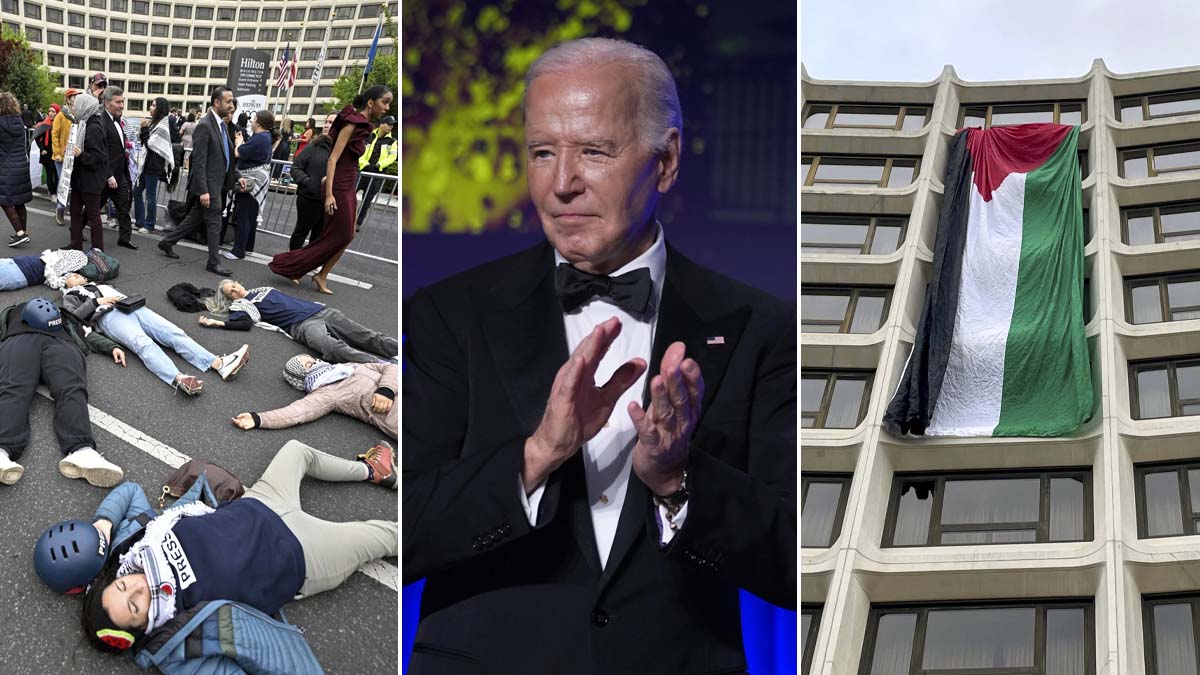
Anti-Israel protesters swarmed the streets surrounding Saturday evening’s White House Correspondents’ Dinner, shouting at attendees and draping a massive Palestinian flag from one of the windows of the host hotel.
Associated Press reporter Farnoush Amiri commented on the crowds waiting outside the venue, saying that the scene before her was very different than it had been in years past.
“This is my third year covering the WHCD as the designated AP reporter for the WH pool and I’ve never seen anything like this,” she said of the gathered protesters. “President Biden’s motorcade will likely drive by these crowds shortly.”
This is my third year covering the WHCD as the designated AP reporter for the WH pool and I’ve never seen anything like this. President Biden’s motorcade will likely drive by these crowds shortly. https://t.co/ZnJjhCrmly
— Farnoush Amiri (@FarnoushAmiri) April 27, 2024
Amiri also noted that President Joe Biden’s motorcade took a different route to the event than it had in years past — and her assumption was that they were attempting to avoid the protests as much as possible.
In President Biden’s motorcade, which took a different route to the dinner than previous years, likely to avoid protesters. But some still were able to get through on the side streets. pic.twitter.com/3SmhH1YCFh
— Farnoush Amiri (@FarnoushAmiri) April 27, 2024
Protesters carried signs referencing journalists who have reportedly been killed in Gaza.
Scenes from outside the #WHCD where protesters are supporting a boycott called for by the colleagues of journalists killed in Gaza pic.twitter.com/J3kJZUYU3g
— nikki mccann ramírez (@NikkiMcR) April 27, 2024
Protesters attempted to surround attendees — among them Caitlyn Jenner — and confront them as they arrived, calling on journalists to boycott the event.
The protesters claimed they were there “to protest media complicity in genocide,” complaining that Palestinian journalists were being killed “with full U.S. backing” for reporting on the situation in Gaza.
Caitlyn Jenner confronted by protestors at White House Correspondents Dinner.
They’re here “to protest media complicity in genocide” & uplift calls from Palestinian journalists to boycott the event “as they are being targeted & killed for doing their jobs, with full US backing.” pic.twitter.com/OG7QLhl8zM
— Prem Thakker (@prem_thakker) April 27, 2024
“The pro-Hamas crowd has arrived outside the White House Correspondent’s Dinner and is VERY upset about me filming them,” Katie Pavlich posted.
The pro-Hamas crowd has arrived outside the White House Correspondent’s Dinner and is VERY upset about me filming them pic.twitter.com/xEg3a8EPDR
— Katie Pavlich (@KatiePavlich) April 27, 2024
The Palestinian flag, according to witnesses, was draped from a window of the Washington Hilton just before President Joe Biden was expected to arrive at the venue.
Demonstrators draped a massive Palestinian flag from the Washington Hilton just moments before POTUS is due for #WHCD pic.twitter.com/lbEnXlugcy
— Sean Langille (@SeanLangille) April 27, 2024
WUSA9 reporter Alexis Wainwright shared several videos of the protest, confirming that those present were calling for a boycott of the dinner.
Protests still happening right now outside of the White House Correspondents dinner at the Washington Hilton on Connecticut Ave NW.
They are calling for a boycott of this dinner. @wusa9 pic.twitter.com/M7VfYCiloo
— Alexis Wainwright (@AWainwrightTV) April 28, 2024
She also reported that at least one protester had been escorted away by police, prompting other protesters to yell at officers to let the person go.
Now other protesters have come over to call for police to let the person who’s been taken into custody go. pic.twitter.com/3oTHOSUu1K
— Alexis Wainwright (@AWainwrightTV) April 28, 2024
Ousted MSNBC host Mehdi Hasan publicly stated that despite attending the WHCD in the past, he would join with the anti-Israel protesters and sit this one out.
I have attended the White House Correspondents Dinner for the past two years. I decided not to attend today’s dinner (which, to be clear, is hosted by DC journalists not the White House) in solidarity with under-fire Palestinian journalists in Gaza who have called for a boycott. https://t.co/HZ6v1m9RTq
— Mehdi Hasan (@mehdirhasan) April 27, 2024
News
Justice Thomas Raises Question About Legitimacy of Special Counsel’s Trump Investigation
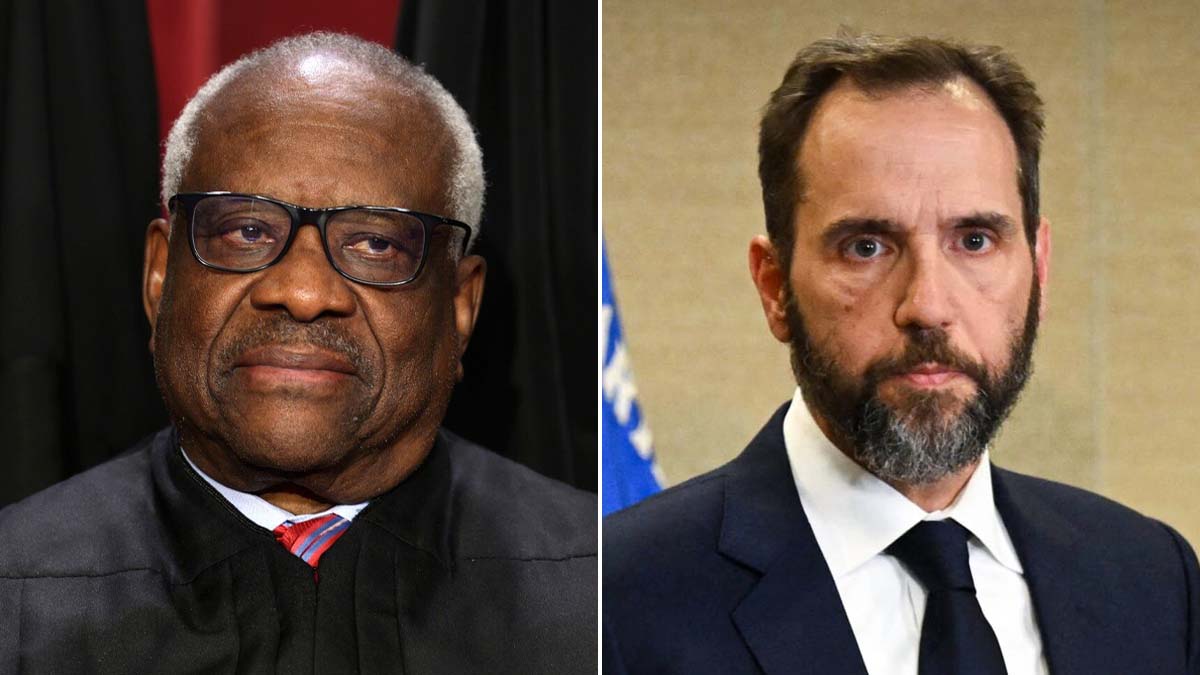
Supreme Court Justice Clarence Thomas raised a question Thursday that goes to the heart of Special Counsel Jack Smith’s charges against former President Donald Trump.
The high court was considering Trump’s argument that he is immune from prosecution for actions he took while president, but another issue is whether Smith and the Office of Special Counsel have the authority to bring charges at all.
“Did you, in this litigation, challenge the appointment of special counsel?” Thomas asked Trump attorney John Sauer on Thursday during a nearly three-hour session at the Supreme Court.
Sauer replied that Trump’s attorneys had not raised that concern “directly” in the current Supreme Court case — in which justices are considering Trump’s arguments that presidential immunity precludes the prosecution of charges that the former president illegally sought to overturn the 2020 election.
Sauer told Thomas that, “we totally agree with the analysis provided by Attorney General Meese [III] and Attorney General Mukasey.”
“It points to a very important issue here because one of [the special counsel’s] arguments is, of course, that we should have this presumption of regularity. That runs into the reality that we have here an extraordinary prosecutorial power being exercised by someone who was never nominated by the president or confirmed by the Senate at any time. So we agree with that position. We hadn’t raised it yet in this case when this case went up on appeal,” Sauer said.
In a 42-page amicus brief presented to the high court in March, Meese and Mukasey questioned whether “Jack Smith has lawful authority to undertake the ‘criminal prosecution'” of Trump. Mukasey and Meese — both former U.S. attorneys general — said Smith and the Office of Special Counsel itself have no authority to prosecute, in part because he was never confirmed by the Senate to any position.
Federal prosecutions, “can be taken only by persons properly appointed as federal officers to properly created federal offices,” Meese and Mukasey argued. “But neither Smith nor the position of special counsel under which he purportedly acts meets those criteria. He wields tremendous power, effectively answerable to no one, by design. And that is a serious problem for the rule of law — whatever one may think of former President Trump or the conduct on January 6, 2021, that Smith challenges in the underlying case.”
The crux of the problem, according to Meese, is that Smith was never confirmed by the Senate as a U.S. attorney, and no other statute allows the U.S. attorney general to name merely anyone as special counsel. Smith was acting U.S. attorney for a federal district in Tennessee in 2017, but he was never nominated to the position. He resigned from the private sector after then-President Trump nominated a different prosecutor as U.S. attorney for the middle district of Tennessee.
Meese and Mukasey argued that because the special counsel exercises broad authority to convene grand juries and make prosecutorial decisions, independent of the White House or the attorney general, he is far more powerful than any government officer who has not been confirmed by the Senate.
Sauer and Trump’s other attorneys objected to the legitimacy of Smith’s appointment in the charges against Trump in the classified documents case, also brought by Smith, before a Florida federal court.
In a March court filing in Florida, Trump’s attorneys claimed that the special counsel’s office argues in federal court that Smith is wholly independent of the White House and Garland — contradicting Trump’s arguments that the federal charges against him are politically motivated. But at the same time, the special counsel’s attorneys insist that Smith is subordinate to the attorney general, and therefore not subject to Senate confirmation under the Appointments Clause of the U.S. Constitution.
“There is significant tension between the Office’s assurances to that court that Smith is independent, and not prosecuting the Republican nominee for President at the direction of the Biden Administration, and the Office’s assurance here that Smith is not independent and is instead so thoroughly supervised and accountable to President Biden and Attorney General Garland that this Court should not be concerned about such tremendous power being exercised to alter the trajectory of the ongoing presidential election,” Trump’s attorneys wrote in the filing.
The special counsel’s office, responding to Trump’s claims in the Florida case, argued that the attorney general “has the statutory authority to appoint a Special Prosecutor” and that the Supreme Court even upheld that authority “in closely analogous circumstances nearly 50 years ago” — in a 1974 case that challenged the prosecutor investigating the late President Richard Nixon.
Meese and Mukasey wrote in their brief that the Nixon case was irrelevant because it “concerned the relationship between the President and DOJ as an institution, not between the President and any specific actor purportedly appointed by DOJ.”
The pair also said special counsel investigations are necessary and often lawful, but stated that “the Attorney General cannot appoint someone never confirmed by the Senate, as a substitute United States Attorney under the title ‘Special Counsel.’ Smith’s appointment was thus unlawful, as are all actions flowing from it, including his prosecution of former President Trump.”
Smith was a private citizen when Attorney General Merrick Garland appointed him as special counsel to investigate Trump in 2022.
Other recent special counsels — including John Durham’s Trump-Russia probe; David Weiss of the Hunter Biden investigation; and Robert Hur, who investigated Biden’s mishandling of classified documents — were all confirmed by the Senate to various positions before being named as special counsels.
The Florida court has yet to rule on Trump’s motion to dismiss the classified documents case due to claims that Smith was improperly appointed.
The Supreme Court is expected to rule on Trump’s immunity arguments before its term ends in June.
News
Weinstein Taken to Hospital After Transferring to Rikers Island Jail Ahead of Court Appearance
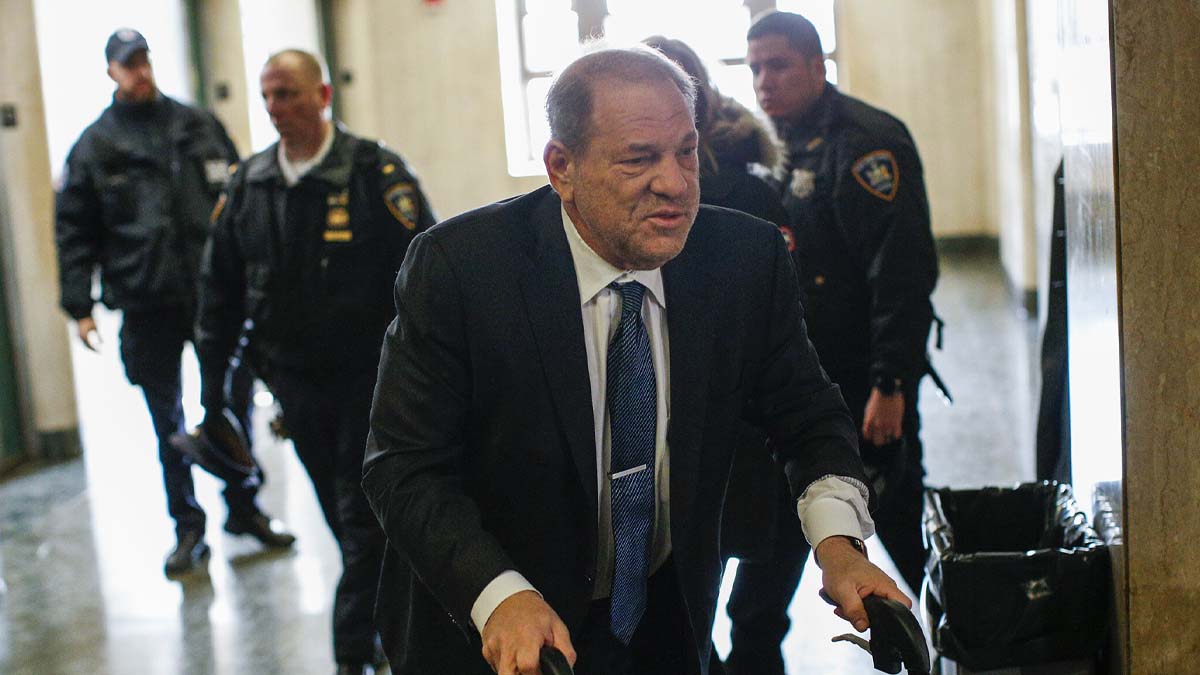
Harvey Weinstein was hospitalized Saturday for a battery of tests after returning to Rikers Island jail ahead of a court appearance next week.
The 72-year-old former Hollywood powerhouse was taken to Bellevue Hospital in Manhattan for a more thorough exam after he was checked out by doctors at Rikers, his attorney, Arthur Aidala, said.
Aidala said it seems Weinstein “needs a lot of help, physically.”
“He’s got a lot of problems,” Aidala said. “He’s getting all kinds of tests. He’s somewhat of a train wreck healthwise.”
On Friday, he was transferred from Mohawk Correctional Facility, about 42 miles from Syracuse, New York, to a medical ward at Rikers in New York City and is scheduled to appear before a judge after New York’s highest court overturned his 2020 rape conviction.
Weinstein was serving a 23-year sentence at Mohawk after he was found guilty of forcibly performing oral sex on a television and film production assistant in 2006 and rape in the third degree for an attack on an aspiring actress in 2013.
He will appear in Manhattan Criminal Court on Wednesday at 2:15 p.m. before Judge Curtis Farber.
In a shocking 4-3 decision Thursday, the New York Court of Appeals overturned Weinstein’s conviction after it found that the judge in the landmark #MeToo trial prejudiced the former film mogul with improper rulings, including a decision to let women testify about allegations that weren’t part of the case.
The court said it “erroneously admitted testimony of uncharged, alleged prior sexual acts” and the “testimony served no material non-propensity purpose.”
Although the conviction was overturned, Weinstein remained in prison after he was convicted in 2022 in Los Angeles of rape. He was acquitted of a count of sexual battery in that case. Weinstein has filed a notice to appeal that verdict as well.
The Manhattan District Attorney’s Office said Thursday that it would do “everything in our power to retry this case, and remain steadfast in our commitment to survivors of sexual assault.”
In an updated statement Friday, the district attorney’s office said its mission was to “center survivors’ experiences and wellbeing in every decision we make, which we will do as we approach the next steps in this case.”
News
Trump, RFK Jr. Exchange Broadsides
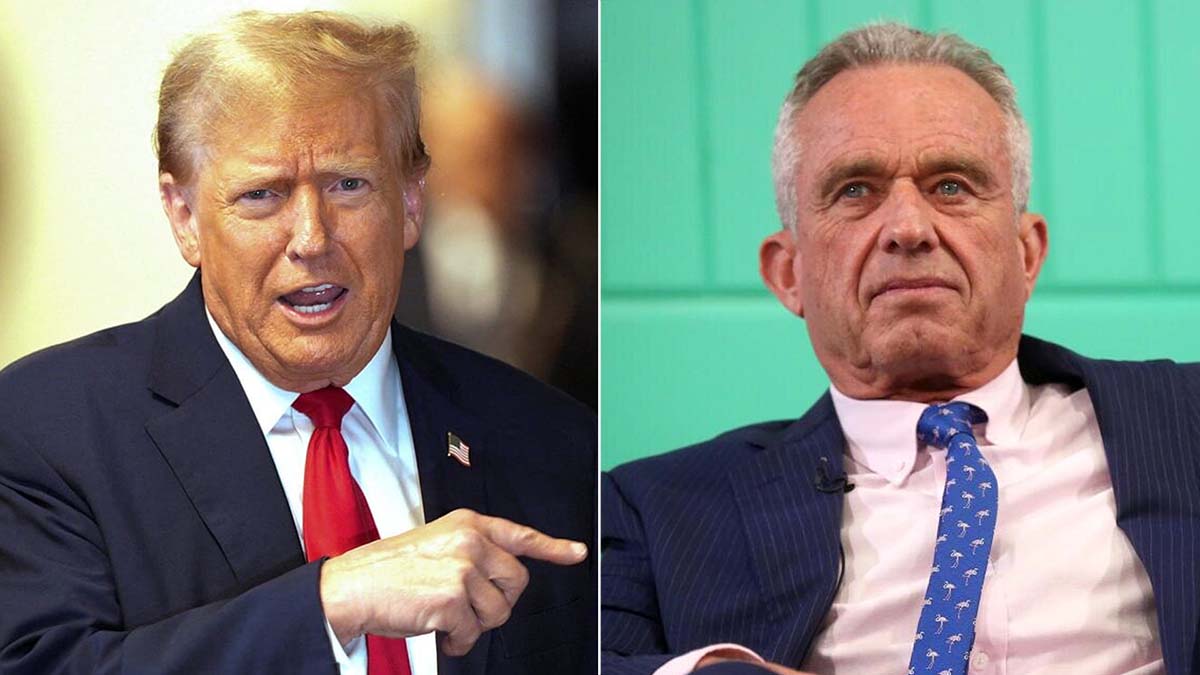
Presumptive 2024 Republican presidential nominee Donald Trump blasted the Independent candidacy of Robert F. Kennedy Jr. in a series of TRUTH Social posts Friday night, who hit back with his own broadside Saturday.
Trump said he would even “take Biden” as president over Kennedy, adding that Democrats “deserve” the Independent candidate in the last part of his three-post attack. The former president said he “watched” Kennedy “convince” former Democratic New York Gov. Andrew Cuomo to implement “outright NASTY” environmental policies in the state.
“I lived with RFK Jr. in New York and watched him convince Governor Cuomo to make Environmental moves that were outright NASTY,” Trump wrote. “Upstate New York was not allowed to drill or frack as Ohio, Pennsylvania, and others ripped off New York Energy. Because of this, prices have skyrocketed all over that part of the Country, but especially Upstate New York and New England. Their Energy Costs are the highest in the U.S., with the exception of California, run by Gavin Newscum, the Worst Governor in the State’s History.”
“I’d even take Biden over Junior,” because our Country would last a year or two longer prior to collapse – But it would be dead either way,” Trump wrote. “His Views on Vaccines are FAKE, as is everything else about his Candidacy. Let the Democrats have RFK Jr. They deserve him!”
Trump described Kennedy as a “Democrat ‘Plant’” in his first post, claiming that a vote for Kennedy would be “a WASTED PROTEST VOTE.”
The GOP candidate also slammed Kennedy’s “Liberal” running mate, Nicole Shanahan, in his second post, saying her “business was doing surgery on her husband’s wallet.”
Kennedy responded to Trump’s broadside Saturday on X (formerly Twitter); the Kennedy campaign referred to the tweet when the Daily Caller requested a comment.
When frightened men take to social media they risk descending into vitriol, which makes them sound unhinged. President Trump’s rant against me is a barely coherent barrage of wild and inaccurate claims that should best be resolved in the American tradition of presidential debate.…
— Robert F. Kennedy Jr (@RobertKennedyJr) April 27, 2024
Kennedy recently secured 2024 election ballot access in the key battleground state of Michigan. Kennedy is also on the ballot in Utah and nearing access in North Carolina, New Hampshire, Nevada, Georgia, Arizona, South Carolina, Idaho, Nebraska, Iowa and Hawaii.
Trump leads Biden 49% to 46% in Michigan, according to a recent Quinnipiac poll. Kennedy sits at 9% in Michigan when added for consideration, with “Other” taking more support from Biden, who moves to 40%, than Trump, who moves to 43%.
Kennedy also polled at 11% in Nevada, 10% in Arizona and 7% in Georgia.
News
Florida Rep Becomes Latest Republican to Announce Retirement
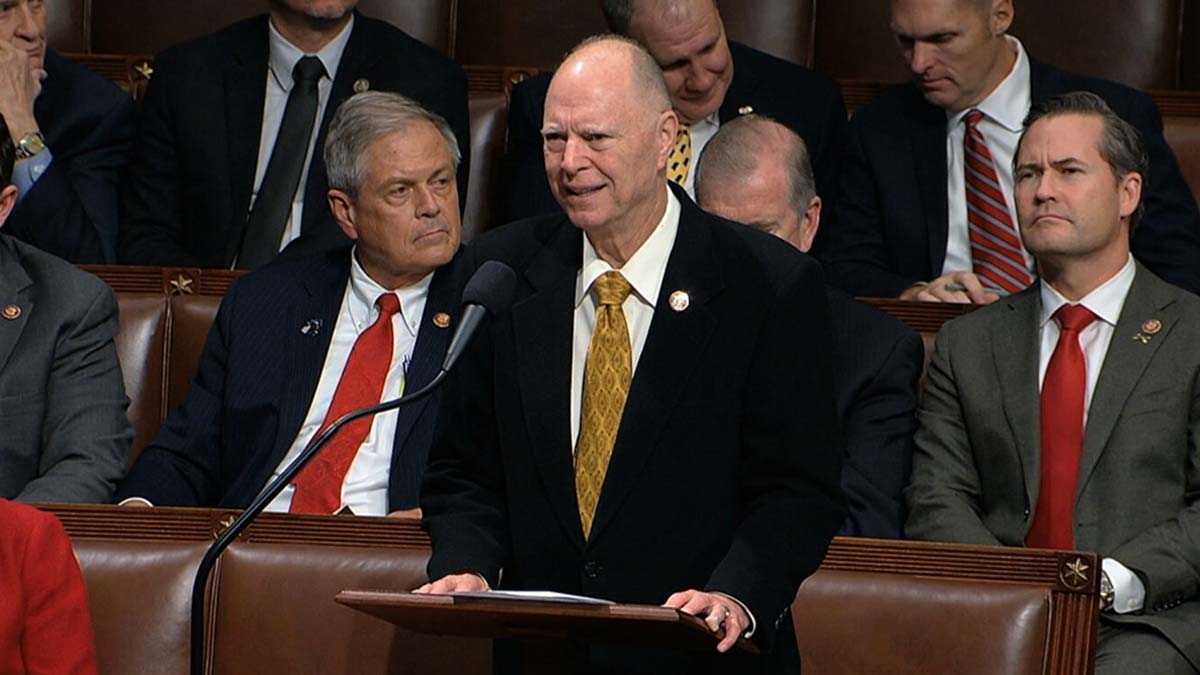
Rep. Bill Posey (R-Fla.) announced Friday that he is retiring at the end of this year, adding to a wave of congressional retirements.
“It has been the greatest honor of Katie’s and my life to represent you in Congress,” Posey said in a statement.
“And, polls suggest that because of YOUR support, I could remain in the job forever, and we were looking forward to another spirited campaign for a final term in office.”
“However, earlier this week circumstances beyond my control now require me to suspect my re-election campaign,” he added.
Posey, 76, has represented Florida’s 8th Congressional District since 2008. According to Cook Political Report, the district is solidly Republican.
The Florida lawmaker said he looks forward to helping former President Trump get reelected and said his goal was to see state Senate President Mike Haridopolos replace him in the House.
“For many years, Mike has served as my Congressional Finance Committee Chairman, while I have mentored him to replace me,” Posey said.
“Mike was, and remains, my first choice to represent you, me, and our district in Congress.”
Without going into a lot of personal details, stars aligned during the past week and Mike decided he was ready for Congress,” he continued, highlighting Haridopolos’s conservative values and strong work ethic. “I enthusiastically endorse him and will do everything I can to help him get elected.”
Posey’s announcement comes after a slew of other GOP lawmakers announced they would also not seek reelection in 2024, and others — such as former Speaker Kevin McCarthy (Calif.) and former Reps. Mike Gallagher (Ill.) and Ken Buck (Colo.) — who left Congress before the end of the term.
While Posey didn’t mention what it was like within the House in his announcement, many of the Republicans leaving office voiced a common theme for their departure: the toxicity of Capitol Hill.
News
Russell Brand Announces Baptism

Actor and comedian Russell Brand announced Friday that he is going to be baptized this weekend, the culmination of his months-long public wrestling with the tenets of Christianity.
“This Sunday, I’m taking the plunge,” Brand, 48, said in a video he posted to X. “I’m getting baptized.”
Baptism. This Sunday I’m taking the plunge! How was it for you? pic.twitter.com/DnwcUrzoqa
— Russell Brand (@rustyrockets) April 26, 2024
Brand said he had heard baptism explained to him as “an opportunity to die and be reborn; an opportunity to leave the past behind and be reborn in Christ’s name like it says in Galatians — that you can live as an enlightened and awakened person.”
He also referenced what he suggested were non-Christian reflections on the same theme of embracing death for the sake of life, quoting Stoic philosopher and Roman emperor Marcus Aurelius and the Buddha.
“All of these things seem so inviting and beautiful,” he said.
Brand also suggested that increasing numbers are turning back to Christianity as the empty value system of modernity disintegrates and leaves them wanting more.
“I know a lot of people are sort of cynical about the increasing interest in Christianity and the return to God, but to me, it’s obvious,” he said. “As meaning deteriorates in the modern world, as our value systems and institutions crumble, all of us become increasingly aware that there is this eerily familiar awakening and beckoning figure that we’ve all known all of our lives, within us and around us. And for me, it’s very exciting.”
Brand added that he intends to get baptized in the heavily polluted River Thames, joking that he might be also getting baptized in toxoplasmosis and E. coli.
“I may be leaving behind the sins, but I might be picking up some pretty serious viruses,” he said.
Brand’s baptism comes after other videos he has been making in recent months about his spiritual journey to the Christian faith.
In December, he told followers he was reading the Bible and The Problem of Pain, a 1940 book by C.S. Lewis that explores the role of suffering in the Christian life.
In January, he noted that he was reading Rick Warren’s The Purpose-Driven Life, and that he desired a “personal relationship with God” as he found Jesus Christ increasingly important as he grows older, despite once seeing many churches as either too “old-fashioned” or too modernized.
“The reason I wear a cross is because Christianity and, in particular, the figure of Christ, are, it seems to me, inevitably becoming more important as I become more familiar with suffering, purpose, self, and not-self,” he said at the time.
In March, he posted a video explaining that he had been visiting churches of various denominations with the intention of possibly getting baptized, and asked his followers their opinions on the sacrament.
During an interview with Tucker Carlson last year, Brand said, “Like many desperate people, I need spirituality. I need God, or I cannot cope in this world. I need to believe in the best in people.”
Acknowledging he “didn’t have enough self-discipline to resist the allure of stardom,” he said he “fell face-first into the glitter, and I’m only just pulling myself out now.”
Brand faces multiple allegations of sexual misconduct going back years, including one report that claims he assaulted a 16-year-old girl after pulling her into an “emotionally and sexually abusive” relationship.
Brand has denied the “very serious criminal allegations” and maintained that while he was “very, very promiscuous” in the past, all of his sexual relationships were “always consensual.”
News
Putin Didn’t Directly Order Navalny Death, US Spy Agencies Find
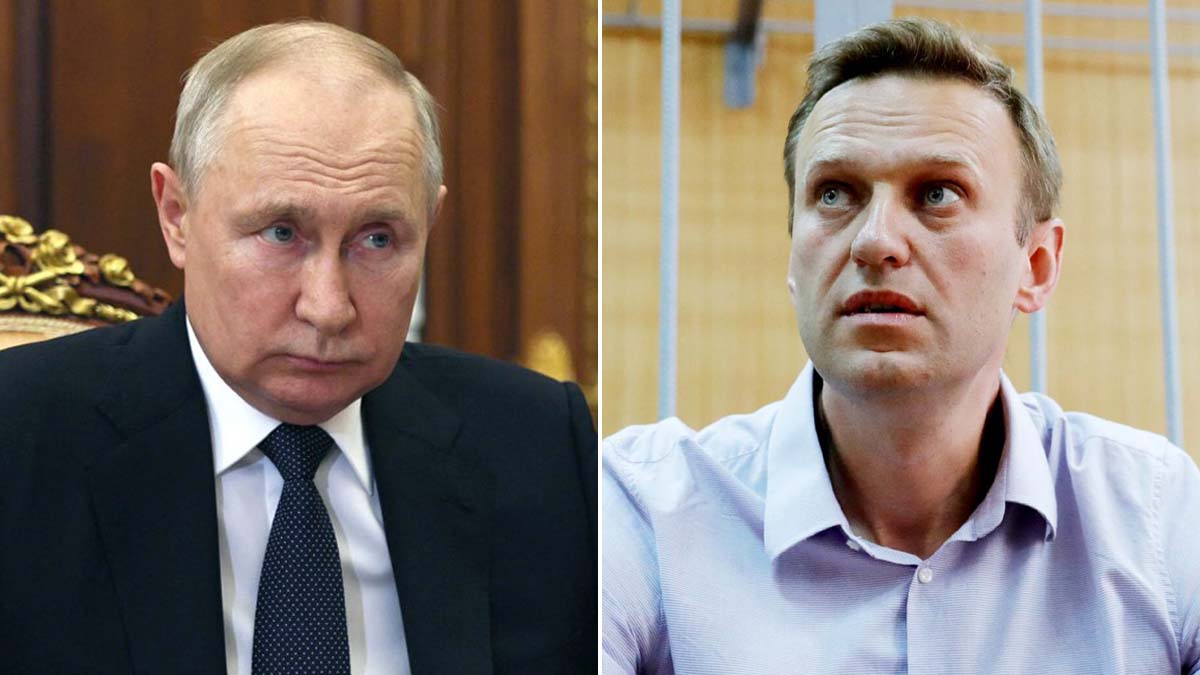
U.S. intelligence agencies have concluded that Russian President Vladimir Putin probably didn’t directly order the killing of Alexei Navalny at a remote penal colony in February, according to three sources familiar with the matter. But the precise circumstances of the opposition leader’s death at the Arctic prison remain unclear.
The assessment does not absolve Putin of ultimate responsibility for Navalny’s fate, only that the Russian president likely did not call for his killing at that time, the sources said. By sending Navalny to the notorious high-security penal colony in a remote town above the Arctic Circle, the Kremlin had effectively imposed a death sentence on the opposition leader, the sources said.
The findings reflected a broad consensus across different intelligence agencies, the sources said.
The Wall Street Journal was first to report the intelligence community’s assessment.
Following Navalny’s death, President Joe Biden said that while Washington lacked information on the exact circumstances, “there is no doubt that the death of Navalny was a consequence of something Putin and his thugs did.”
Russia’s Federal Penitentiary Service said in a statement at the time that Navalny had died after feeling unwell following a walk.
The CIA and the Office of the Director of National Intelligence declined to comment.
Navalny was 47 when he died and was serving a combined 30 ½-year prison sentence. As Russia’s most high-profile and popular dissident, Navalny’s death dealt a severe blow to the country’s opposition movement, which has been brutally suppressed by the Kremlin.
During a business trip in Russia in 2020, Navalny was poisoned with a military nerve agent, Novichok. Navalny and Western officials blamed the attempt on Navalny’s life on Putin.
The poison used on Navalny was similar to the one the Russian military intelligence service employed against a retired Russian military intelligence officer, Sergei Skripal, in a 2018 assassination attempt in the United Kingdom, according to Western governments.
Russia has denied the government was involved in Navalny’s poisoning in 2020 or his death in prison in February.
Before Navalny’s death, there had been tentative discussions about a possible prisoner exchange with Russia involving Navalny and Americans detained in Russia, NBC News previously reported.
Navalny’s allies allege that Putin had the dissident killed to thwart the proposed prisoner swap that would have freed him.
News
Iranian Women Sexually Assaulted and Beaten in New Morality Police Crackdown

Iranian women are being sexually assaulted, tasered and beaten in a fresh morality police crackdown on those flouting Tehran’s strict dress codes.
Multiple videos posted online show women being bundled into the back of vehicles for infractions as minor as wearing a coat that is too short or too colourful.
Under the code name “Noor” or “light” in Farsi, the Islamic Republic has launched a major new clampdown on anyone violating its draconian female dress codes.
Women in Iran told The Telegraph of sexual abuse and being denied entry to public spaces such as subway stations, universities, and cafes for not complying with headscarf rules or for wearing fitted trousers.
The latest severe measures started on April 13, just hours before Iran launched hundreds of suicide drones and missiles at Israel.
Many Iranians speculate this timing was chosen because global attention was diverted.
“I was approached by a group of plainclothes officers at around 5pm last Wednesday when I was walking on the pavement towards home,” said Taranom, 25, a civil engineering student in Karaj, near the capital Tehran.
“I had my headscarf loosely draped around my neck, ready to be pulled up if I encountered them but everything unfolded too swiftly for me to react,” she added.
“One of them, with a long beard, made a call and requested a van to be brought to the scene,” she recalled
“Shortly after, he began touching me inappropriately. He was touching my breasts and was telling me ‘Isn’t this what you wanted by coming out like this? Enjoy then’. It was the worst moment of my life,” she said.
“I tried to resist, but another one of them grabbed me by the hair and slammed me onto the ground.
“Feeling helpless, I attempted to scream and call for help but there was no one there. I stood up but another one grabbed my shirt and slammed me to the ground again,” she recalled.
A white van arrived a few minutes later and she was dragged inside while screaming. Four other girls, all crying, were already in the vehicle. They were then taken to a police station where they found dozens of other women.
She waited in a room for five hours.
Eventually, her name was called and she was given papers to sign. She said the documents stated she should not appear without a hijab again and that she would not file a complaint about the officers’ behaviour.
News
Devastating Tornadoes Flatten Homes in Nebraska and Iowa
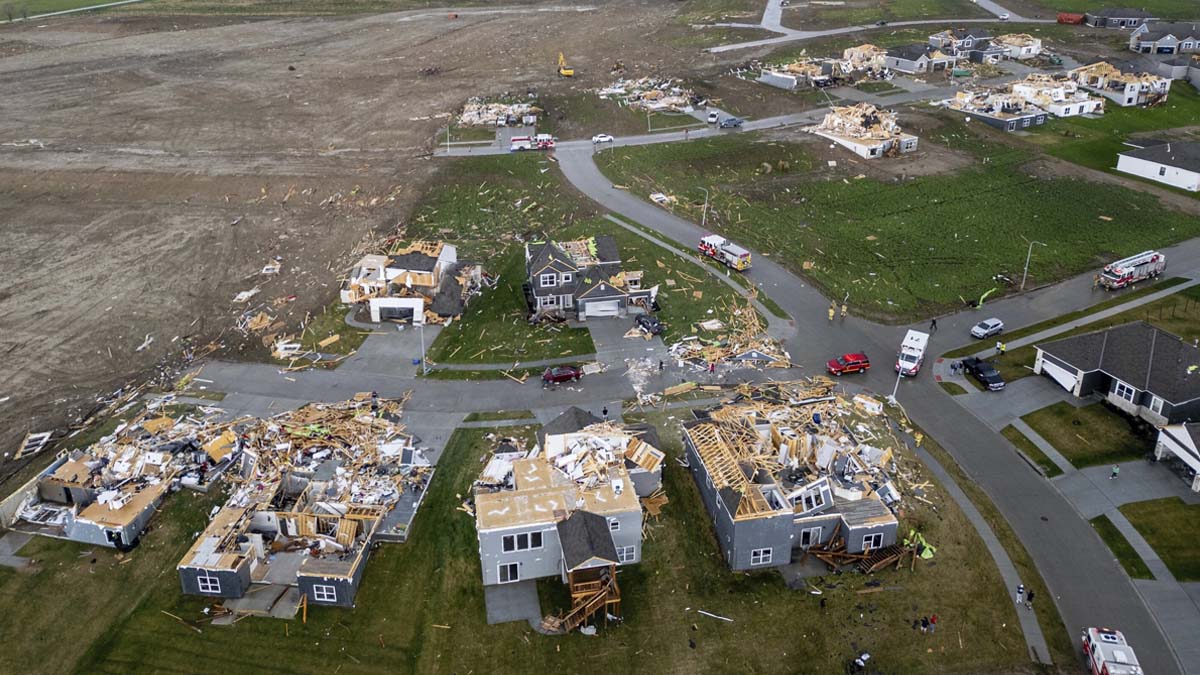
Destructive tornadoes gutted homes as they plowed through Nebraska and Iowa, and the dangerous storm threat could escalate Saturday as tornado-spawning storms pose a risk from Michigan to Texas.
The area of Elkhorn in Omaha, Nebraska, is one of the hardest-hit communities after severe storms barreled through parts of the Plains and South early Friday afternoon, authorities said. A powerful tornado leveled homes, which crews searched for anyone trapped or injured, local authorities said.
Meanwhile in nearby Iowa, a large tornado was reported in the small city of Minden, according to the National Weather Service.
The severe weather threat is expected to continue through Sunday, with Saturday possibly being the most dangerous day. Strong tornadoes are possible from Nebraska to Texas, including Dallas, Austin, Oklahoma City, Tulsa, Kansas City and Wichita.
A tornado watch is in effect for parts of western Oklahoma and northwest Texas until 1 p.m. Saturday, according to the Storm Prediction Center. Hail could grow to the size of tennis balls, with storms harboring winds up to 70 mph and the tornado threat increasing through the morning. The watch includes Altus, Oklahoma, and Childress, Texas.
And 18 million people across Nebraska, Iowa, Kansas, Missouri, Oklahoma and Texas are under flood watches through Sunday afternoon, according to the National Weather Service. Long-track destructive tornadoes and heavy rain are expected, with the worst of the storms during the evening and overnight on Saturday.
Here’s the latest:
Four people in Iowa’s Pottawattamie County suffered storm-related injuries and received medical treatment, county emergency management officials said in a news release early Saturday.
Roughly 120 homes and businesses were damaged in Pottawattamie County, where Minden is located and the home of about 90,000 residents. “Preliminary information indicates varying degrees of damage,” emergency officials said.
Omaha’s Eppley Airfield reopened for aircraft operations Saturday but delays were expected, city officials said. The passenger terminal was not affected by the storm, but damage assessments at the airport were ongoing.
Two people in Omaha received medical treatment for minor injuries after a tornado swept through the Elkhorn area Friday. “We think injuries were so little because the warning systems in the City of Omaha and Douglas County were highly effective,” Omaha Police Chief Todd Schmaderer said. “We were not hit with a sudden storm. People had warned of this, which saved lives.”
Emergency officials in Nebraska’s Shelby and Douglas counties said there were no reports of serious injuries there after several tornadoes hit their communities Friday. However, the officials reported the storms inflicted significant property damage, and residents have been displaced.
On the outskirts of Lincoln, Nebraska, a tornado tore the roofs off homes and crossed part of I-80 as it cut through. Multiple cars of a train derailed near Waverly after it was struck by a tornado, according to a railway spokesperson.
In response to the tornado that tore through Minden, Iowa Gov. Kim Reynolds issued a disaster proclamation to support storm recovery efforts in Pottawattamie County.
At least two tornadoes were observed in Texas on Friday afternoon. Video posted to social media showed an apparent twister churning across a large field northeast of Waco.
There were nearly 80 tornado reports Friday across at least five states, many of which have been confirmed by the weather service or through footage from storm chasers.
What to expect Saturday
More than 50 million people are under the threat of severe weather Saturday from the Southern Plains into the Great Lakes region.
“A complex but potentially significant severe weather episode is expected on Saturday,” the Weather Prediction Center said Friday.
The most significant storms are possible starting in the afternoon in parts of the southern and central Plains, where a Level 4 of 5 risk of severe thunderstorms is in place. Widespread damaging wind gusts, hail up to the size of baseballs and strong tornadoes are the storms’ main hazards.
“Several strong tornadoes will be likely, and a few long-track EF3+ tornadoes (winds between 136 and 165 mph) will be possible,” the Storm Prediction Center said.
The tornado threat could ramp up considerably through the late afternoon and evening hours with “multiple strong tornadoes” possible, according to the prediction center.
Damaging storms are possible outside of the greatest risk area in a huge area of the country from the Great Lakes to southern Texas.
Rain could also be a culprit Saturday.
Some areas could see nearly 5 inches of rain in a short period and dangerous flash flooding could result. A handful of locations caught under multiple rounds of gushing rainfall could have totals approach the 8-inch mark.
A Level 3 of 4 risk of excessive rainfall is in place for a large portion of Oklahoma – including Oklahoma City and Tulsa – and smaller parts of Kansas and Texas. Intense rainfall could force streams to overflow their banks and flood roadways.
Sunday could still see storms
Damaging storms also are possible from Texas to Wisconsin Sunday. But the exact timing, extent and strength of these storms will depend heavily on Saturday night’s storms.
Notably, areas from northeastern Texas to southern Iowa and western Illinois face the greatest chance for damaging storms that could bring strong wind gusts and large hail. An isolated tornado or two is also possible.
Heavy, flooding rainfall is possible, especially in parts of the Lower Mississippi Valley.
News
Man Who Filmed Ashli Babbitt Killing Sentenced to 6 Years in Prison
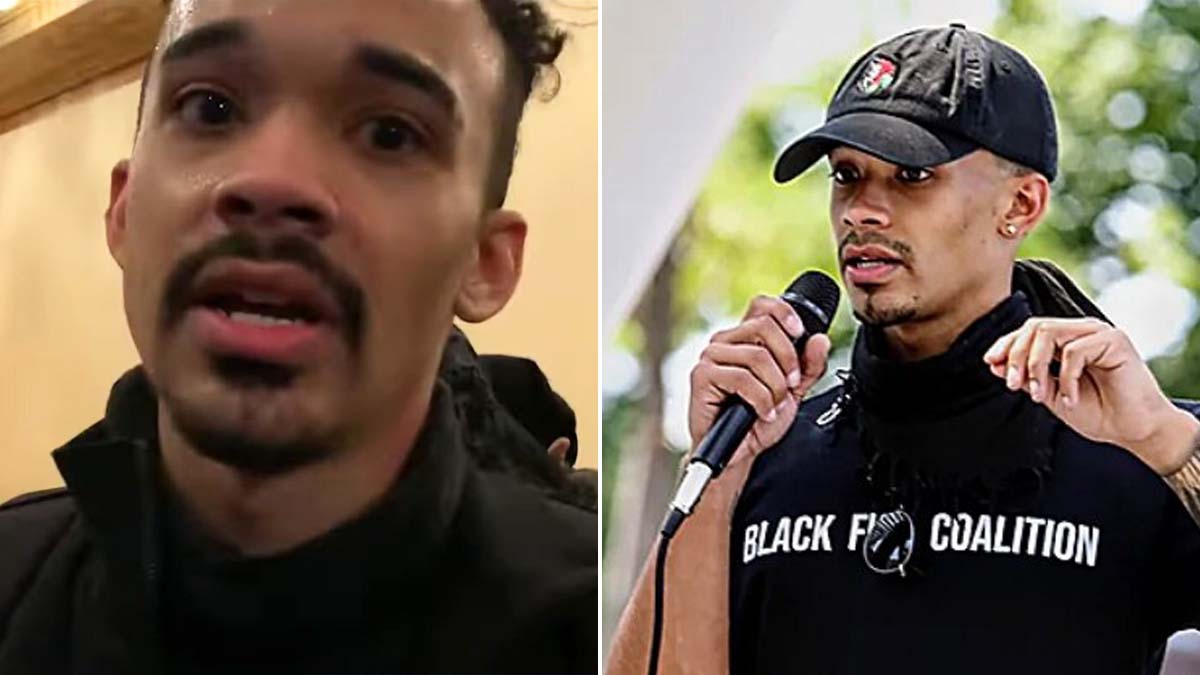
John Earle Sullivan, the onetime racial-justice BLM activist and provocateur who filmed the deadly shooting of Ashli Babbitt at the U.S. Capitol on Jan. 6, 2021, was sentenced to six years in federal prison by a judge in Washington D.C.
Mr. Sullivan, 29, of Tooele, Utah, did not receive the 87 months recommended by federal prosecutors for his role on Jan. 6. But his 72-month sentence was well beyond the 30 months his defense attorney recommended.
The sentence meted out on April 26 by U.S. District Judge Royce Lamberth brought to a close the more than three-year prosecution of Mr. Sullivan, one of the most recognizable Jan. 6 figures. He was arrested on Jan. 14, 2021—one of the first Jan. 6 suspects taken into custody by the FBI.
Judge Lamberth sentenced Mr. Sullivan to serve two years of supervised release after his prison term and ordered him to pay $2,520 in restitution and special assessments.
Mr. Sullivan came to the Jan. 6 events in Washington trailed by filmmaker Jade Sacker, who has since published a documentary about the liberal Mr. Sullivan and his conservative activist brother James.
Although media continue to report that Mr. Sullivan dressed as a Trump supporter on Jan. 6, that wasn’t true. On Jan. 5, he posted a widely shared photo of himself to social media donned in a Trump ball cap. He did not wear Trump gear on Jan. 6.
Mr. Sullivan was found guilty by a District of Columbia jury in November 2023 of obstruction of an official proceeding, civil disorder and aiding and abetting, entering and remaining in a restricted building or grounds with a dangerous weapon, disorderly and disruptive conduct in a restricted building or grounds with a dangerous weapon, unlawful possession of a dangerous weapon on Capitol grounds, disorderly conduct in a restricted building or grounds, and parading, demonstrating, or picketing in a Capitol building.
Judge Lamberth denied Mr. Sullivan’s motion for release from jail pending the U.S. Supreme Court’s forthcoming decision on the constitutionality of the felony obstruction of an official proceeding charge used against at least 353 Jan. 6 defendants.
The High Court heard oral arguments in that case on April 16 and is expected to rule by late June.
‘I’ve Got a Knife’
The weapon that brought Mr. Sullivan enhanced felony charges was a retractable dual-edge Smith & Wesson M&P tactical knife—something Mr. Sullivan boasted about to the crowd outside the Speaker’s Lobby, where Ms. Babbitt was shot at 2:44 p.m.
“Let me through, I’ve got a knife,” Mr. Sullivan said as he moved through the dense crowd, according to his video. “I’ve got a knife.”
Once he reached the left side of the Speaker’s Lobby entrance, Mr. Sullivan lobbied Capitol Police Officer Kyle Yetter to abandon his post—for his own safety.
“Bro, I’ve seen people out there get hurt,” Mr. Sullivan said. “I don’t want to see you get hurt.”
As soon as Mr. Yetter, Capitol Police Sgt. Timothy Lively, and Officer Christopher Lanciano moved away from the door that they had been guarding, Mr. Sullivan urged the men around him, “Go! Go! Let’s go! Get this [expletive],” according to his video.
A short time later, Mr. Sullivan was the first to call out the presence of Capitol Police Lt. Michael Byrd, who crept along the other side of the entrance with his Glock pistol pointed toward the crowded hallway.
“There’s a gun! There’s a gun! There’s a gun!” Mr. Sullivan shouted as the service weapon became visible on his video screen.
Mr. Sullivan’s video showed Mr. Byrd repeatedly placing his finger on the trigger of his gun and removing it before he lunged forward and fired the weapon at Ms. Babbitt, who had just begun climbing into a broken outside window of the doorway.
In an interview filmed moments later by Infowars employee Sam Montoya, a highly agitated Mr. Sullivan said he believed he saw Ms. Babbitt die.
‘I Have the Video’
“She climbed in the window and then she got shot right here in the neck,” Mr. Sullivan told Mr. Montoya. “I got it all. I’ll post the video. I have the video. I have the video of the guy with the gun and then shoot her. …I have it all. I was right at the door.”
As it turned out, Ms. Babbitt was still alive as Capitol Police officers carried her head-first to the ground floor of the Capitol. Even as she was loaded into an ambulance, Ms. Babbitt bled profusely from the upper chest wound caused by Mr. Byrd’s bullet. She was pronounced dead at 3:15 p.m. at MedStar Washington Hospital Center.
Mr. Sullivan was paid $90,000 by several media outlets for the use of his Jan. 6 video, money that was seized by the U.S. Department of Justice.
Prosecutors said Mr. Sullivan’s Jan. 6 conduct was a continuation of the violent rhetoric he expressed during the civil unrest in 2020 after the controversial death of George Floyd in Minneapolis.
Mr. Sullivan dubbed himself “Jayden X” and “Activist John,” and operated a website called “Insurgence USA.”
“Going into winter of 2020, Sullivan began to advocate for a violent dismantling of the government,” prosecutors wrote in their 45-page sentencing memorandum. “In one Instagram post, Sullivan posted, ‘We will have live updates on the location for tonight’s purge. Spread the message. Let the electoral purge commence.’
“In December 2020, Sullivan tweeted, ‘Riots are meant to bring change, so purge the world with fire,’ and, ‘An armed revolution is the only way to bring about change effectively.’”
Mr. Sullivan’s sentencing memo said his behavior on Jan. 6 was not reflective of the kind of man he is.
“Those who know him from church, from social interactions, and from his supportive family all enthusiastically commend him as a decent, honest man of integrity, good faith and devotion to those in his world,” defense attorney Steven Kiersh wrote.
“John Sullivan’s conduct on January 6, 2021, was clearly a deviation from the person that is reflected in his background,” Mr. Kiersh wrote. “His conduct on that day is not reflective of the totality of the kind, decent and generous man that he is.”
Mr. Kiersh said his client’s mental health has markedly declined since he was jailed following his jury trial. He asked Judge Lamberth to take that into consideration when crafting a sentence.
“Mr. Sullivan has been held in protective custody and in virtual isolation throughout the duration of his incarceration,” Mr. Kiersh wrote. “Undersigned counsel meets with defendant regularly at the D.C. Jail and has seen a dramatic decrease in his mental stability and his overall physical presence.
“Counsel has repeatedly spoken with the D.C. Jail’s legal counsel regarding defendant’s status but has been told there is nothing that can be done to remove his protective custody housing status due to concern for his physical safety,” Mr. Kiersh said.
Mr. Sullivan was born in Galax, Virginia, in July 1994 and adopted by an Army lieutenant colonel and his wife. He earned the rank of Eagle Scout before graduating from high school in Stafford, Virginia.
He moved to Kearns, Utah, in order to pursue his dream of becoming an Olympic speed skater, according to court records. Injuries forced him to abandon his quest for the Winter Olympics.
News
Peter Meijer Drops Out of Michigan GOP Senate Race

Former Rep. Peter Meijer is dropping his bid for Michigan’s open Senate seat, the Republican said in a statement Friday.
“The hard reality is the fundamentals of the race have changed since we launched this campaign. After prayerful consideration, today I withdrew my name from the primary ballot. Without a strong pathway to victory, continuing this campaign only increases the likelihood of a divisive primary that would distract from the essential goal – conservative victories in November,” Meijer said.
One of just 10 House Republicans who voted to impeach former President Donald Trump after the January 6, 2021, riot, Meijer narrowly lost his House primary race in the 2022 midterms to a Trump-endorsed challenger. He entered the state’s Senate race last year despite discouragement from the national party.
The move comes days after Meijer announced that he had turned in enough signatures to qualify for the ballot.
The US Army veteran who served in Iraq leaves a crowded field of candidates vying to replace longtime Democratic Sen. Debbie Stabenow, including former Michigan Rep. Mike Rogers, who Trump endorsed last month. The winner of the GOP primary is likely to take on Rep. Elissa Slotkin, whom Democrats have largely coalesced around in the key battleground state.
Rogers thanked Meijer for “his service to our country & for bringing light to some of the biggest issues facing America and Michigan families” in a social media post on Friday.
“I wish him well, & hope he continues to be a valuable part of the GOP,” he added.
CNN reported last year that the Senate Republican campaign arm privately urged Meijer to sit out of the race out of fear that Meijer could split the primary vote among moderate Republicans and hand the nomination to former Detroit Police chief James Craig, who was disqualified as a gubernatorial candidate in 2022. According to a source familiar with the matter, the campaign arm feared that would take the state off the map for the GOP in 2024. Craig has since suspended his campaign.
Meijer narrowly lost his House primary race in the 2022 midterms to a Trump-endorsed challenger, John Gibbs. Gibbs went on to lose the race to Democrat Hillary Scholten.
The former president slammed Meijer in a social media post Friday following the announcement.
“Once he raised his very little and delicate hand to Impeach President Trump, his Political Career was OVER!” Trump said. “Last time he lost in the Primary to a nice, but unknown, person, and now he lost to a GREAT Candidate, Mike Rogers, who will easily WIN the Nomination, and go on to WIN the Senate, BIG, in Michigan,” Trump added.
News
Blinken: US Has Evidence of China’s Interference in Elections
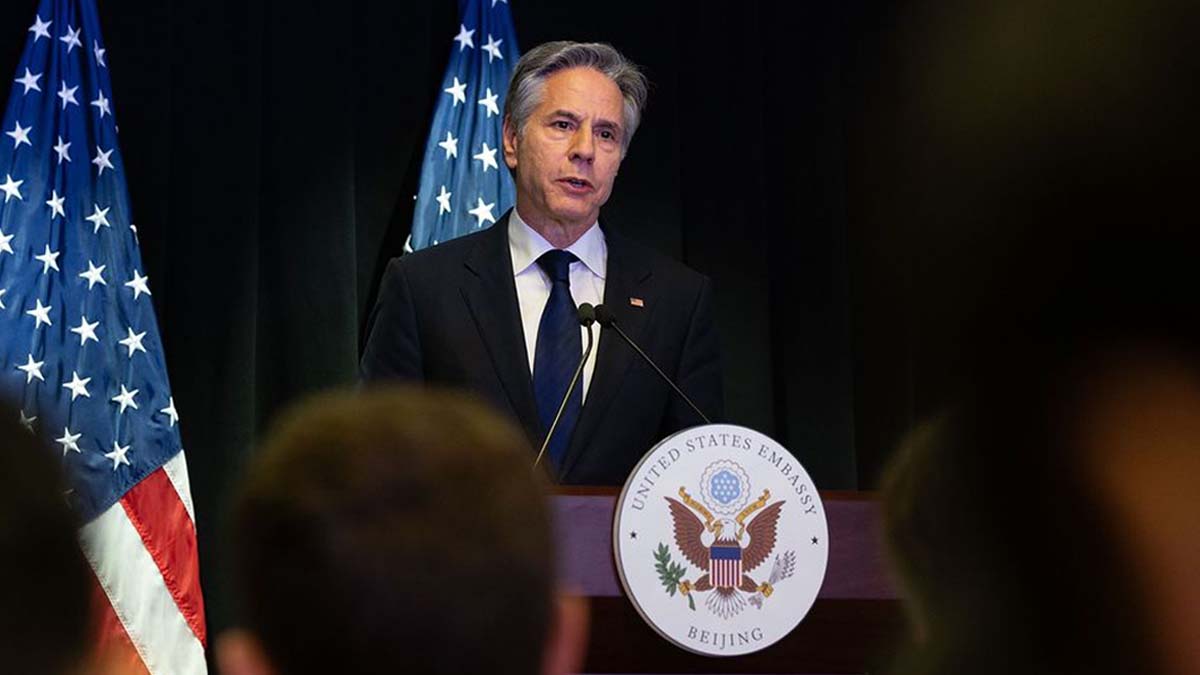
The Biden administration has seen evidence of attempts by China to influence the upcoming U.S. elections, Secretary of State Antony Blinken said in an interview with CNN published Friday.
Blinken, who is wrapping up a three-day visit to China, said he raised in his meetings with Chinese President Xi Jinping and other officials that any interference in the U.S. election is “totally unacceptable.”
Such action would mark a violation of commitments Xi made to President Biden when the two leaders met in November in Woodside, Calif., a watershed meeting aimed at stabilizing deep mistrust and competition between the U.S. and China.
“We have seen, generally speaking, evidence of attempts to influence and arguably interfere, and we want to make sure that that’s cut off as quickly as possible,” Blinken told CNN when asked if Xi had violated the Woodside commitments.
Blinken did not address any specific evidence of Chinese election interference, and he did not say that the Chinese government had violated the commitment Xi had made to Biden.
But The New York Times reported in early April that covert Chinese accounts are masquerading as supporters of former President Trump, the presumptive Republican presidential nominee.
These accounts are also promoting conspiracy theories, stoking domestic divisions and attacking Biden ahead of the election in November.
“Any interference by China in our election is something that we’re looking very carefully at and is totally unacceptable to us, so I wanted to make sure that they heard that message again,” Blinken said he told Xi and other Chinese officials.
In addition to Xi, Blinken met with senior Chinese officials, including China’s Foreign Minister Wang Yi, Minister of Public Security Wang Xiaohong, and Shanghai Party Secretary Chen Jining.
Blinken’s trip was aimed at building on and maintaining open lines of communication with Chinese officials amid tense relations between Washington and Beijing. Blinken said he brought with him the message of the importance of keeping open lines on military-to-military channels to avoid conflict, to make progress on counternarcotics cooperation, and to increase people-to-people ties.
The trip ended with no new announcements on cooperation. Blinken said his trip occurred “at a time of profound tension between our countries” and “with the aim of stabilizing the relationship, reopening and strengthening our high-level channels of communication.”
-
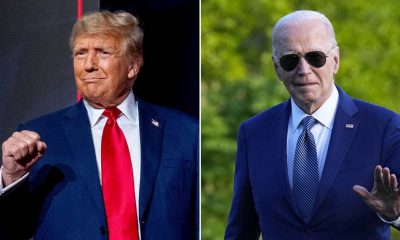

Trump Biggest Lead Ever Over Biden in CNN Poll
9 hours ago • 3 min read • 22 Comments -
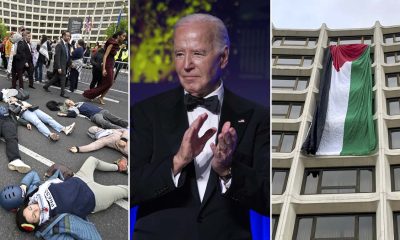

Protesters Swarm White House Correspondents Dinner
23 hours ago • 3 min read • 36 Comments -
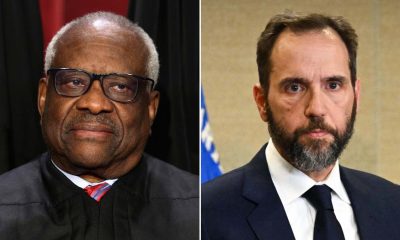

Justice Thomas Raises Question About Legitimacy of Special Counsel’s Trump Investigation
23 hours ago • 4 min read • 24 Comments -
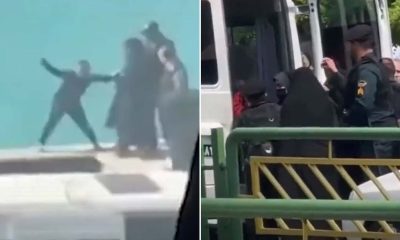

Iranian Women Sexually Assaulted and Beaten in New Morality Police Crackdown
23 hours ago • 2 min read • 8 Comments
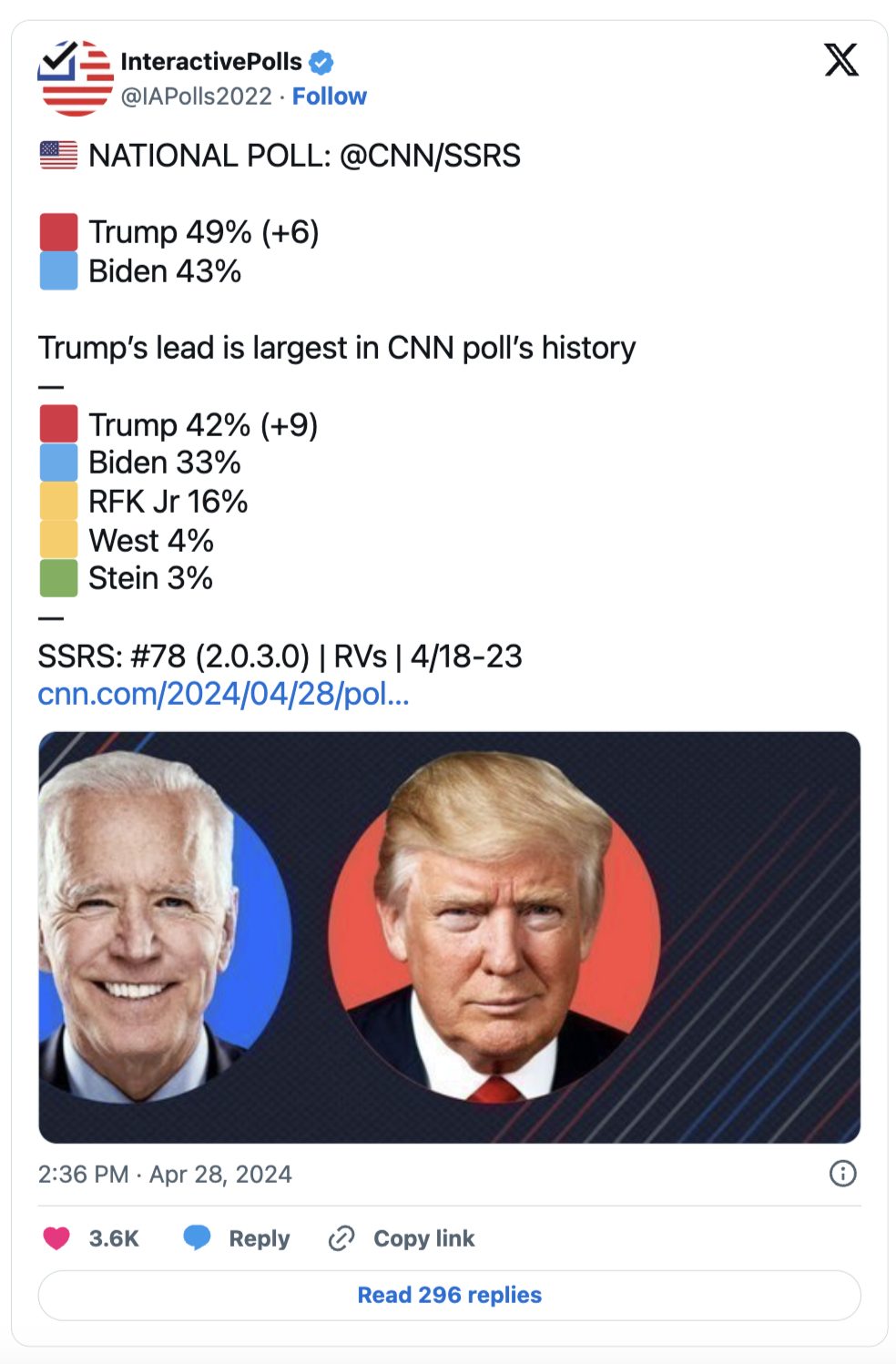


The US wants to talk about affecting elections with show of force and varying corrupt practices. How laughable is that? Our Democrat controlled government is doing exactly the same thing. This fucking government is so corrupt there shouldn’t be a peep out of them.
China was showing force in the straits. What are you talking about?
If it weren’t for the Allies, there would be no China! How fast these Commie oppressors forget what the Japs did to them in WWII and now they have become the enemy.
That applies to Russia as well. Before Operation Barbarossa Russia was fighting WITH Germany against the allies.
I have a Russian friend who learned Russian ‘history’. In their history Russia never sided with Germany and was always the victim. The ‘Winter War’ of 1939-1940, also known as the Russo-Finnish War lasted months. Finland kicked Russia’s ass out of their country. He didn’t even know about that.
He wanted to know why the US didn’t come to help the USSR before 1941 against Hitler. He didn’t know until Operation Barbarossa Stalin was WITH Hitler.
We have a lot of ignorant people in the world. The Chinese people and the Russian people are told what to believe. We get that with both parties in the US now.
If it were not for Richard M. Nixon, China would still be a backwater, rice paddy shit hole that it has been since the first slant eyed monkey shit out a baby in a rice paddy about a zillion years ago. China’s rise the past 50 years rides SQUARELY on the shoulders of Nixon. What an ignorant prick he was! Want to defeat China? CLOSE DOWN WAL MART!
This country is in a position, that we can’t believe anything that is reported. So sure common sense when you decide to vote.